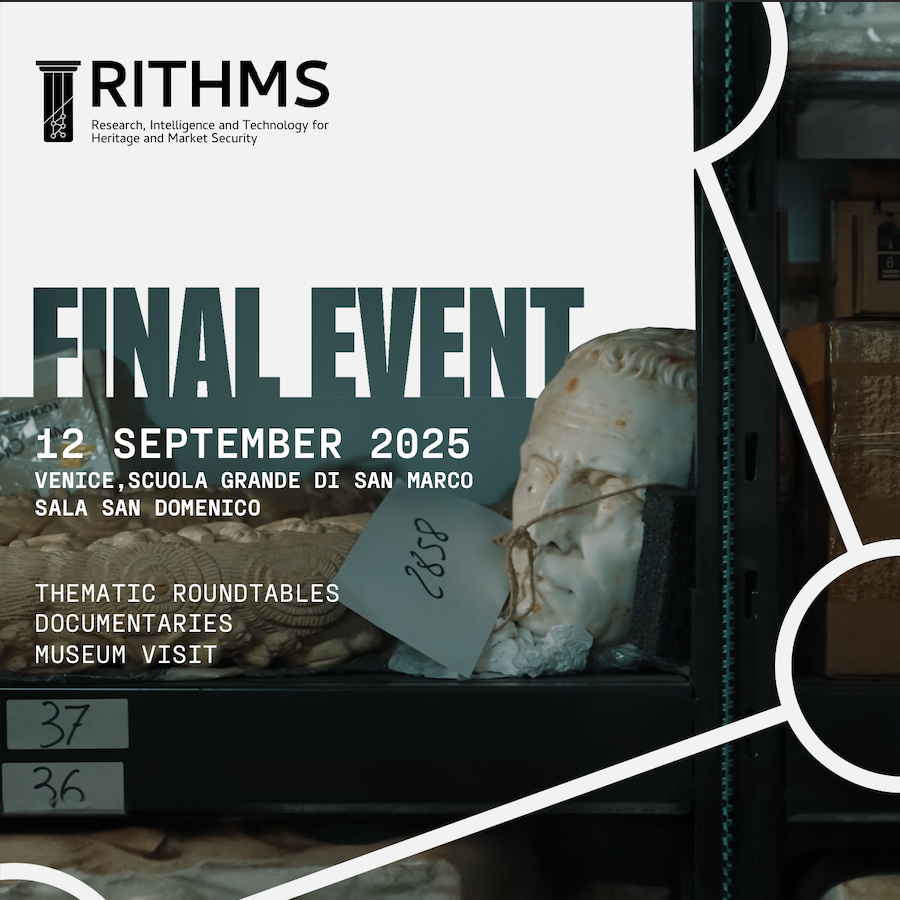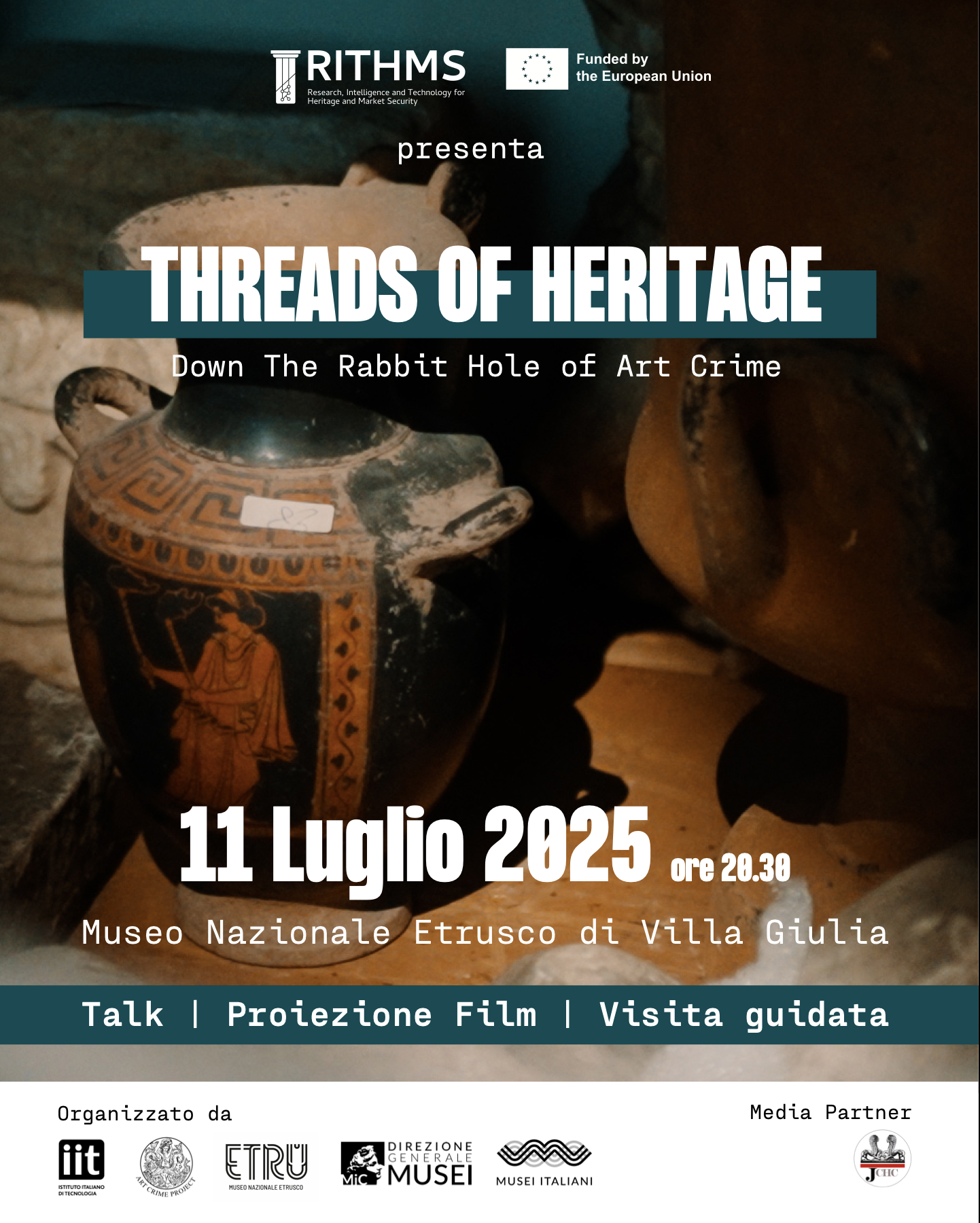
RITHMS Documentary "Threads of Heritage" Summer Screenings
| Fabio Beltotto | News
This July, Threads of Heritage – Down the Rabbit Hole of Art Crime returns to the big screen with two special summer screenings in Rome and Genoa.
Directed by Brian Parodi and produced by the Centre for Cultural Heritage Technology (Istituto Italiano di Tecnologia) in collaboration with No Panic Agency, the documentary explores the hidden networks behind the illicit trafficking of cultural heritage — from illegal excavations to private collections and the black market — while highlighting how new technologies are used to protect and recover cultural treasures.
The first screening, by invitation only, will take place on 11 July 2025 at the Museo Nazionale Etrusco di Villa Giulia in Rome. The evening will open with a panel discussion featuring experts, institutional representatives, and law enforcement officers working to combat art crime. After the film, guests will be offered special guided tours focused on recovered artifacts that reveal the concrete value of preservation efforts.
The second screening, free and open to the public, will be held in Genoa on Monday, 14 July at 9:00 PM in the Cortile Maggiore of Palazzo Ducale, as part of the Circuito Cinema Genova summer programme. The screening will be introduced by a conversation between Arianna Traviglia, Director of the Centre for Cultural Heritage Technology – IIT, and Giacomo Montanari, Genoa’s Councillor for Culture, moderated by art critic and journalist Linda Kaiser.
Threads of Heritage invites viewers to look beyond museum walls and discover the stories, risks, and recoveries that shape the fight to protect our shared cultural heritage.
For more information about the documentary: Click here

RITHMS at the Security Research Event 2025 in Warsaw
| Fabio Beltotto | News
On 24–25 June 2025, the RITHMS Project was showcased at the Security Research Event (SRE) 2025, hosted in Warsaw, by the Coordinator’s team from the Centre for Cultural Heritage Technology (CCHT – Istituto Italiano di Tecnologia) with the support of the European Software Institute (ESI).
Throughout the two-day conference the project team engaged with researchers, policy-makers, and operational practitioners from across Europe, providing live, case-based demonstrations of the RITHMS platform and discussing its potential to counter the illicit trafficking of cultural goods. These interactive sessions enabled participants to evaluate the platform’s functionalities directly against operational needs and to offer valuable feedback for future development.
The programme also featured a public screening of the documentary “Threads of Heritage. Down the Rabbit Hole of Art Crime,” produced within the framework of RITHMS. The film attracted considerable interest among attendees and stimulated a wider conversation on the strategic importance of protecting cultural heritage within the European security agenda.
The RITHMS Consortium extends its appreciation to the event organisers and to all participants for their active engagement and insightful contributions.
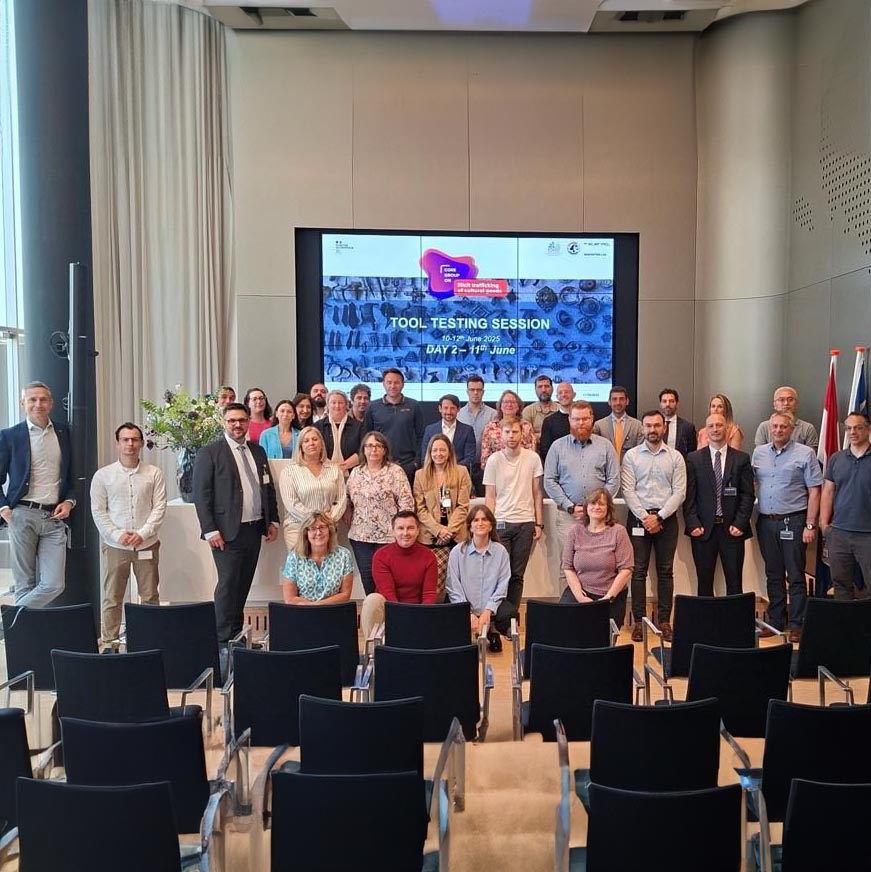
RITHMS at Europol – Core Group on Illicit Trafficking of Cultural Goods
| Fabio Beltotto | News
From 10 to 12 June 2025, the RITHMS Project, represented by the Centre for Cultural Heritage Technology (CCHT – Istituto Italiano di Tecnologia) and the European Software Institute (ESI), took part in the meeting of the EUROPOL Core Group on Illicit Trafficking of Cultural Goods, held in The Hague.
Over the course of the three-day event, the team delivered four detailed demonstrations of the RITHMS platform to law enforcement officers from across Europe, including representatives of project partners Arma dei Carabinieri TPC, Politie Nederland, and the Spanish National Police, as well as EUROPOL’s technical staff.
The meeting provided a valuable opportunity to showcase the platform’s functionalities in an operational context and to collect constructive, hands-on feedback from end users. The insights gathered will directly support the ongoing development of the platform, ensuring its alignment with the needs and priorities of those combating cultural heritage crime.
The RITHMS Consortium extends its sincere thanks to all participants for their interest, engagement, and expert contributions.
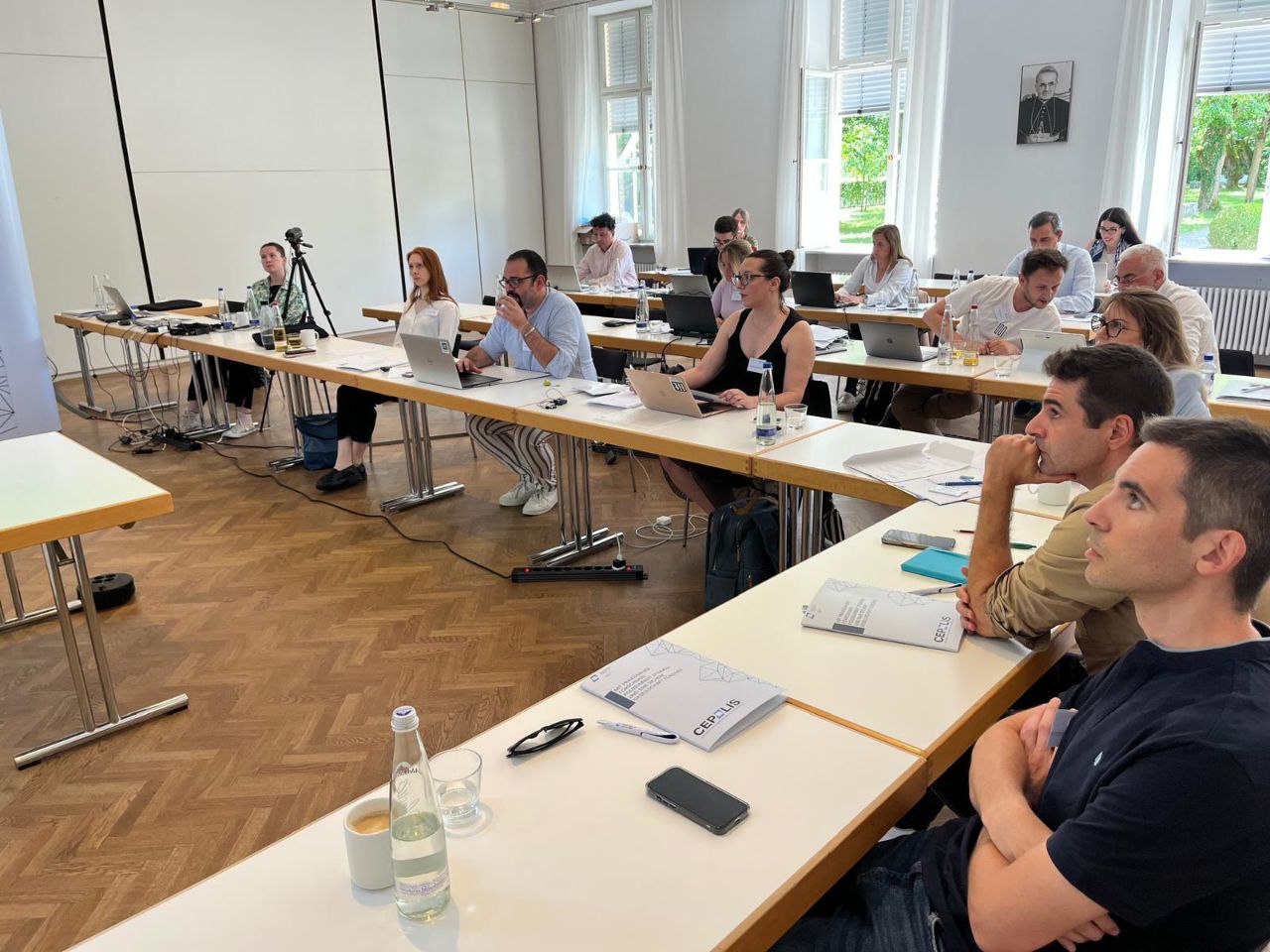
Introductory Training Workshop on the RITHMS Platform
On June 20, in the fascinating venue of Schloss Fürstenried (Munich), the RITHMS Project held the Introductory Training Workshop on the RITHMS Platform, dedicated to Law Enforcement Agencies (LEAs).
The Consortium is glad and honoured for the participation of representatives from the:
◦ Bavarian State Criminal Police Office
◦ Guàrdia Urbana de Barcelona
◦ Romanian Police
◦ Latvian State Police
◦ Italian Carabinieri
◦ Spanish Police
◦ Bosnia and Herzegovina Border Police
◦ Moldova National Police
A special thanks to our keynote speakers Mr. Klein from the Bavarian State Criminal Police Office and Mrs. Shlageder from the Bavaria Ministry of Science and Arts, and to our hosts Sandra Balbierz and Dr. Tobias Mattes from HföD for the logistical organisation, instrumental in the success of the event.
The workshop was designed to provide participants with a comprehensive introduction to the RITHMS platform’s features and functionalities, combining a theoretical overview with practical applications and operational scenarios demonstrated step by step.
This initiative represents a collaborative effort to equip LEAs with advanced tools to support them in addressing the complex challenge of illicit trafficking of cultural goods more effectively.
We look forward to further engaging with the European LEAs as the RITHMS project progresses to its final months.
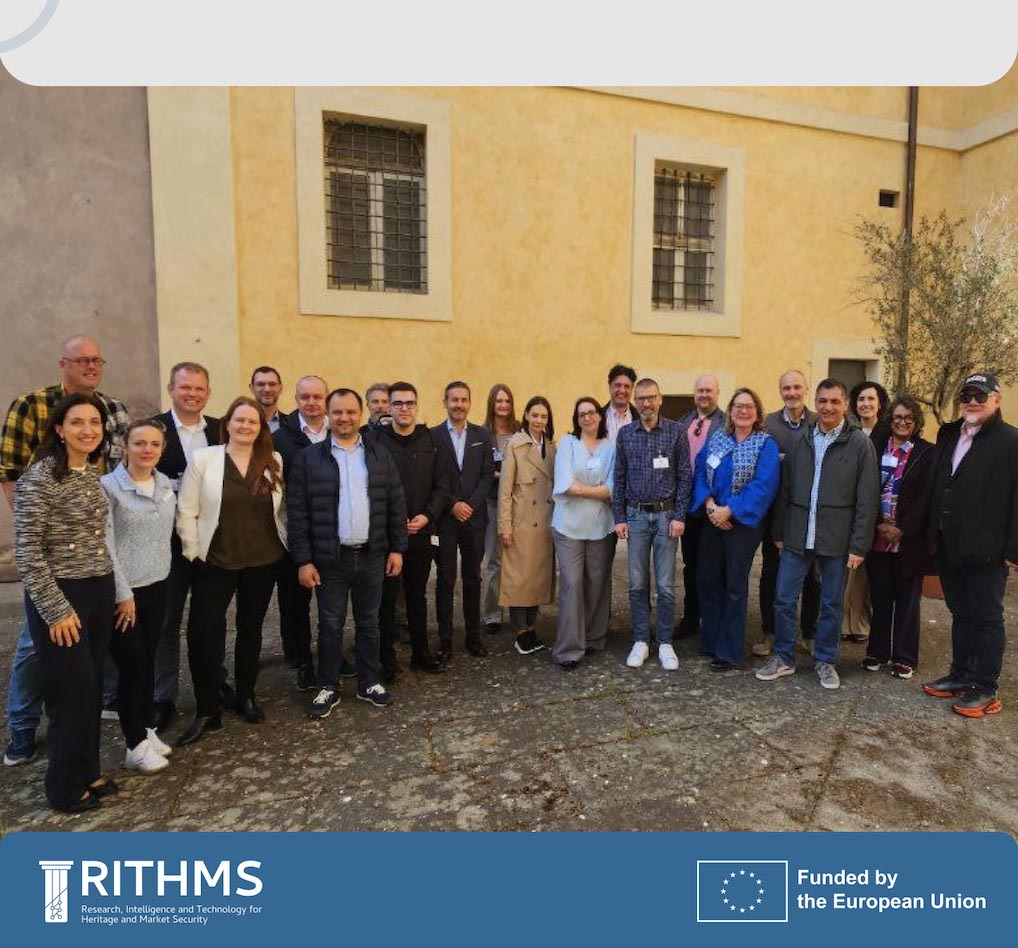
Two Days of Hands-On RITHMS Training for Law Enforcement
On 7-8 April, partnering Law Enforcement Agencies (LEAs) participated in the first RITHMS training workshop, gaining their first hands-on experience with the newly developed RITHMS platform.
This training enabled LEA investigators and data analysts to explore how the platform's advanced tools can be used for accurate and effective intelligence gathering in cases of cultural heritage crimes.
The workshop covered:
- Theoretical insights on the epistemology of data.
- Practical introduction to the RITHMS platform: data collection, cleaning, correlation, knowledge graph database, and social network analysis (SNA) tools.
- Ethics & Security sessions: discussing potential challenges related to the platform deployment at LEA premises.
Participants were introduced to knowledge graph building, network analysis, and insights gathering into criminal networks, which will support their future investigations by generating new leads.
This marks an important step for the project in ensuring LEAs have the proper information to operate the innovative RITHMS tools effectively.
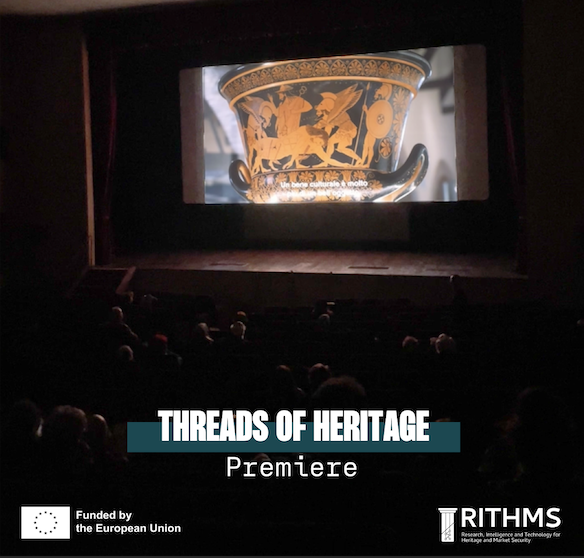
“Threads of Heritage” Premiere at Florence Archeofilm Festival
| Fabio Beltotto | News
The documentary Threads of Heritage made a powerful impact at the Florence Archeofilm Festival, securing second place in audience rankings among more than 80 international films. Premiering at one of the world’s leading festivals dedicated to archaeological and cultural heritage cinema, the film sheds light on the shadowy networks of illicit antiquities trafficking.
Threads of Heritage offers a rare, in-depth look at the illegal trade in cultural artifacts, the destruction of archaeological sites, and the global fight to curb these crimes. With exclusive access to museum storerooms, forensic police investigations, and expert testimonies, the documentary exposes a thriving black market that persists despite international regulations.
The film’s strong reception in Florence underscores the growing public awareness of heritage protection and the crucial role of cultural institutions in stopping the circulation of stolen artifacts.
Find out more about the film here: https://rithms.eu/communication/events/threads-of-heritage-down-the-rabbit-hole-of-art-crime
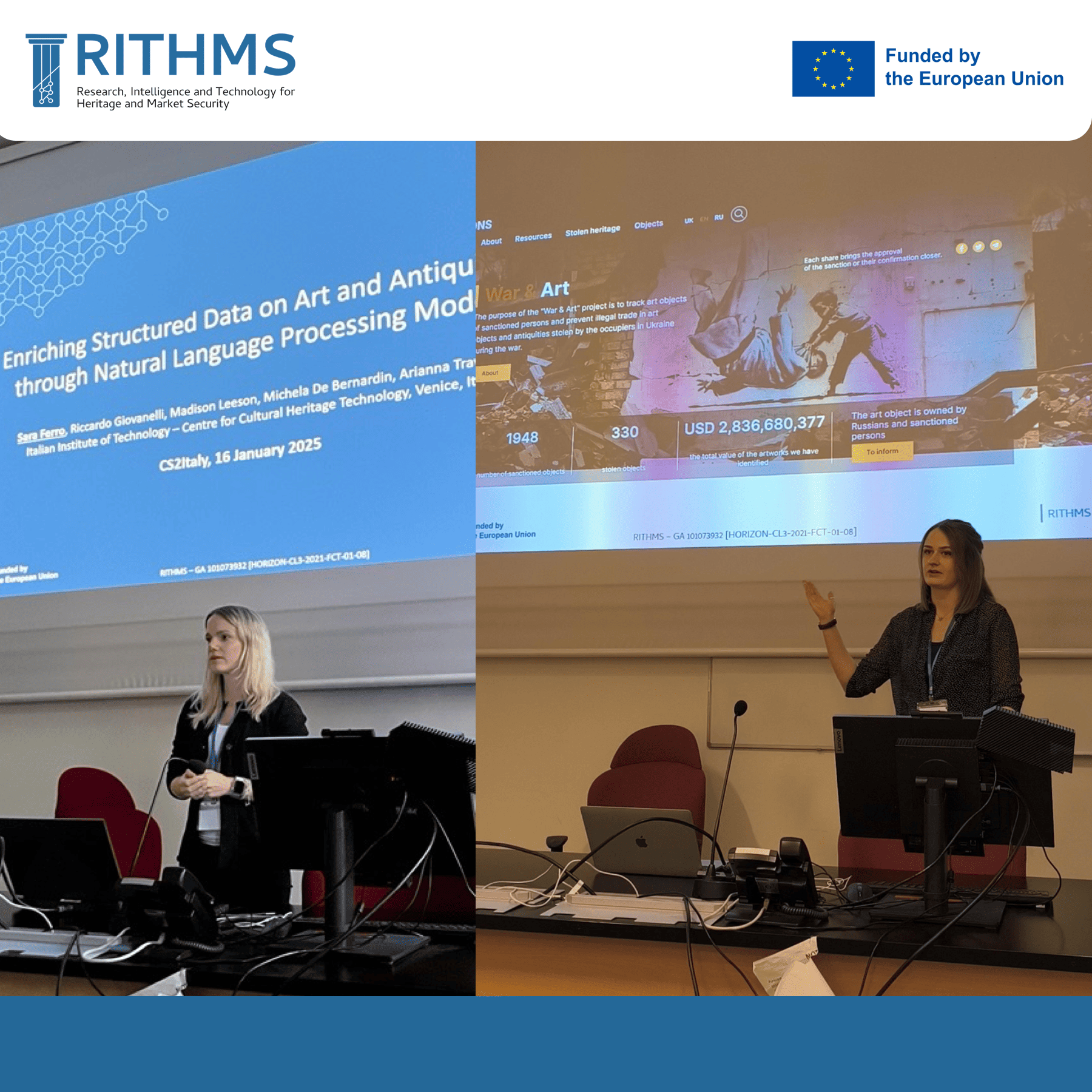
RITHMS at the Conference on Computational Social Science (CS2Italy 2025)
| Fabio Beltotto | News
The RITHMS project is disseminating interesting preliminary results.
This week, two members from the Coordinator's team of the Centre for Cultural Heritage Technology (CCHT Venice) delivered relevant presentations at the Conference on Computational Social Science (CS2Italy 2025), hosted by the Università di Trento.
Dr. Sara Ferro anticipated the main points of the forthcoming paper “Enriching Structured Data on Art and Antiquities through Natural Language Processing Models”.
Her presentation highlighted the potential of Natural Language Processing (NLP) models to transform unstructured data into structured, accessible knowledge in the art and antiquities field. This innovative approach supports social network analysis, offering valuable inputs into cultural goods trafficking.
Dr. Madison Leeson focused, instead, on the social network analysis (SNA) results showcased in the recent paper "War, Art, and Sanctions: Social Network Analysis on the NACP’s Databases of Sanctioned Russian Individuals and Art Collectors".
The study of the Russian elite network revealed the roles and relative influence of art collectors within the system. These findings contribute significantly to understanding social and economic dynamics.
Learn more about RITHMS outputs and publications on our page: https://rithms.eu/results
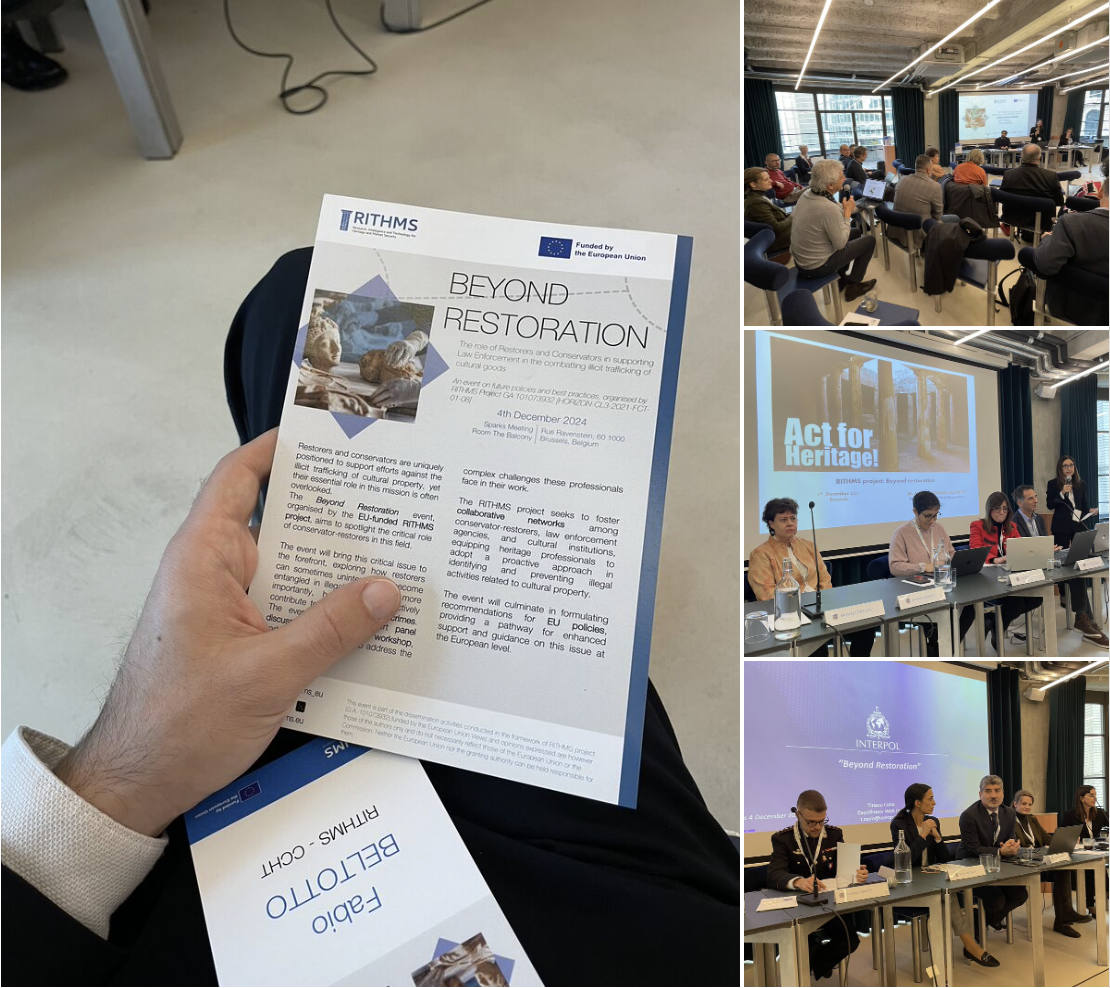
Beyond Restoration Event: Conservator-Restorers in the Fight Against Illicit Trafficking of Cultural Property
The Beyond Restoration event, organized by the RITHMS_EU project, opened today in Brussels, highlighting the essential role of conservator-restorers in combating the trafficking of cultural property.
Through expert panels and workshops, the event fosters collaboration among heritage professionals, law enforcement, and cultural institutions, contributing to stronger policies for cultural heritage protection.
Morning Session: The Crucial Role of Conservator-Restorers
The first part of the day focused on the critical role that conservators and restorers play in the fight against the trafficking of cultural heritage. Experts discussed the unique challenges faced by these professionals, emphasizing the ethical and technical aspects of their work when dealing with damaged or recovered artifacts.
The discussion highlighted the need for collaboration between conservators, law enforcement, and cultural institutions to prevent illegal activities. It underscored the importance of maintaining professional standards, navigating legal and ethical dilemmas, and strengthening international cooperation to safeguard cultural heritage.
This session reaffirmed that conservators and restorers are not just caretakers of history but active participants in protecting cultural heritage from criminal activities.
Afternoon Session: The Role of Law Enforcement Agencies
During the Law Enforcement Agencies session, discussions shed light on the complex and dual role of conservators and restorers in the fight against trafficking of cultural heritage.
Conservators can inadvertently or knowingly become facilitators in the illegal trade of cultural goods. Misguided practices or insufficient awareness of trafficking dynamics may contribute to legitimizing stolen or forged artifacts. On the other hand, their expertise is crucial in combating this phenomenon. Conservators play a pivotal role in determining the authenticity and provenance of artworks and artifacts.
Conclusion: Strengthening Collaboration
The final session emphasized the need for enhanced collaboration between law enforcement and heritage professionals. To empower conservators and restorers, proposed measures included the development of training programs tailored to identifying red flags in trafficking, implementation of clear ethical guidelines, and building stronger networks among stakeholders to support investigations and enforcement efforts.
Ultimately, the involvement of conservators and restorers goes beyond preservation—they are vital allies in safeguarding our shared cultural heritage.
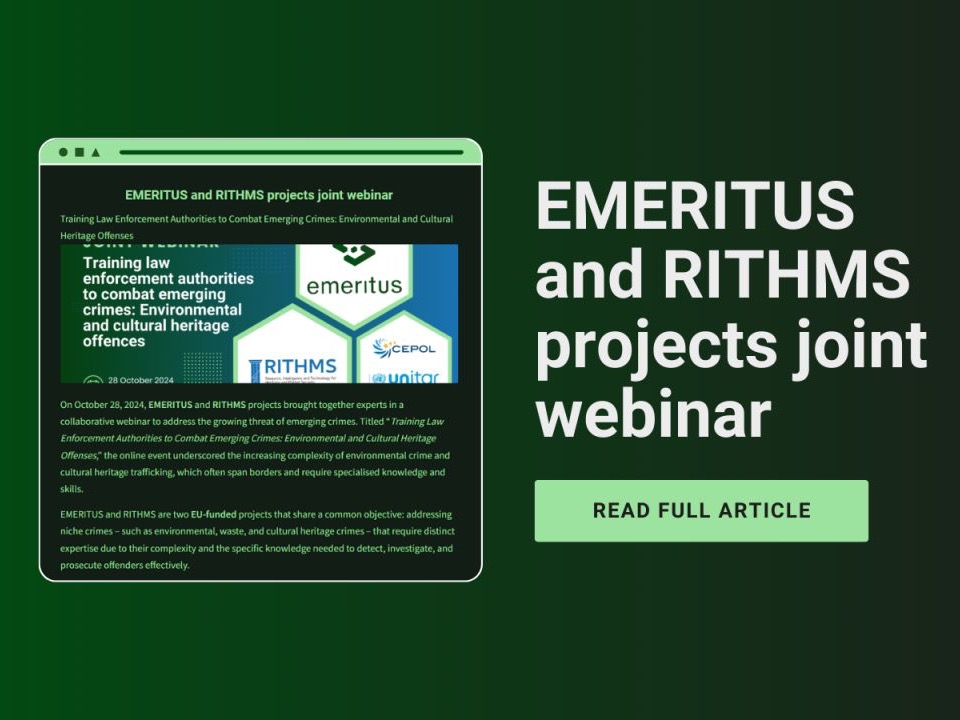
Full report on EMERITUS and RITHMS Joint webinar
| Fabio Beltotto | Joint activities, News
On October 28, 2024, EMERITUS and RITHMS projects brought together experts in a collaborative webinar to address the growing threat of emerging crimes. Titled “Training Law Enforcement Authorities to Combat Emerging Crimes: Environmental and Cultural Heritage Offenses,” the online event underscored the increasing complexity of environmental crime and cultural heritage trafficking, which often span borders and require specialised knowledge and skills.
EMERITUS and RITHMS are two EU-funded projects with a common objective: addressing niche crimes—such as environmental, waste, and cultural heritage crimes—that require distinct expertise due to their complexity and the specific knowledge needed to detect, investigate, and prosecute offenders effectively.
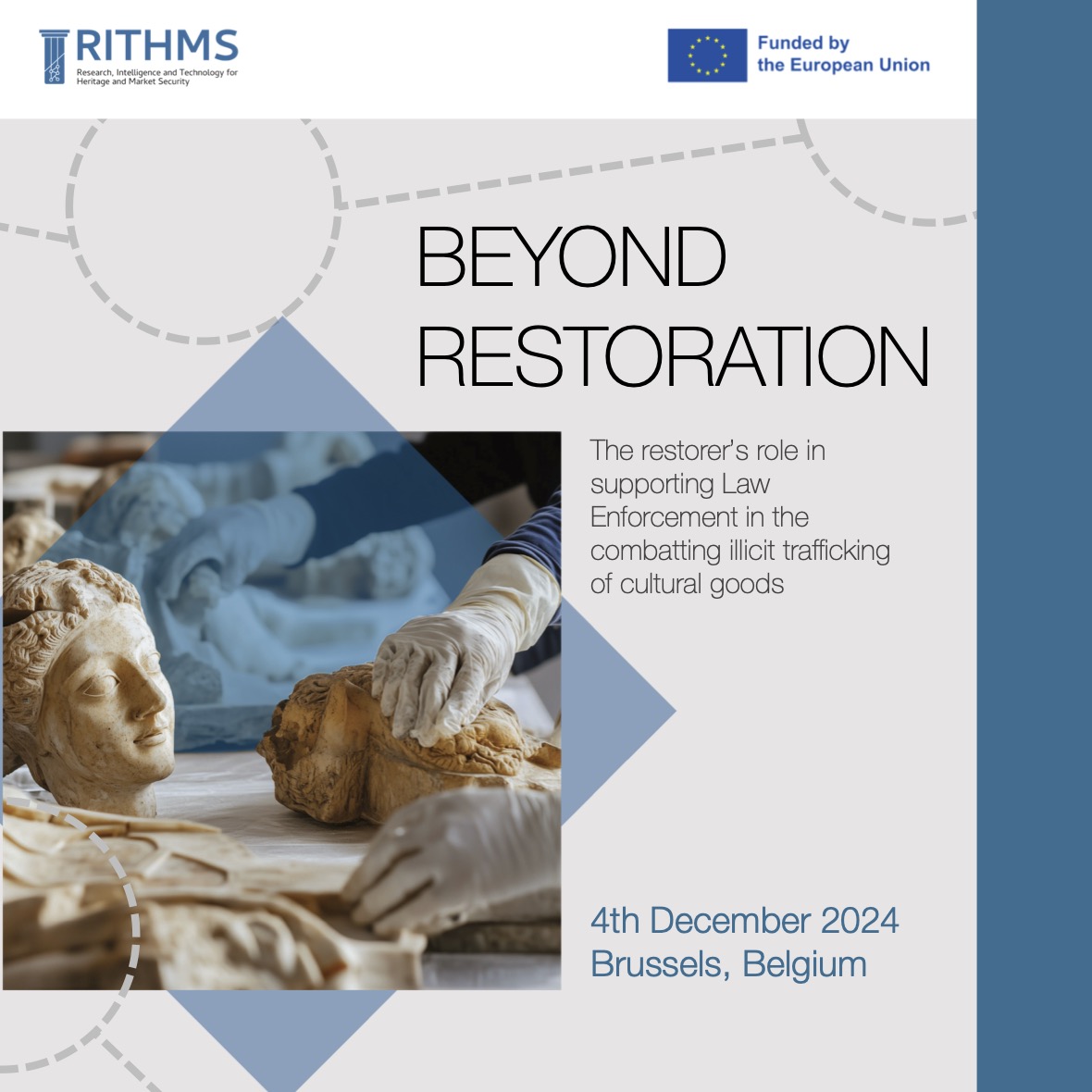
RITHMS presents Beyond Restoration: an event on future policies and best practices
The Beyond Restoration event, organised by the EU- funded RITHMS project, aims to spotlight the critical role of conservator-restorers in this field. Held in Brussels, Belgium, on December 4th, this event will bring this critical issue to the forefront, exploring how restorers can sometimes unintentionally become entangled in illegal activities but, more importantly, how they can actively contribute to combatting these crimes.
Beyond Restoration will feature expert panel discussions, a hands-on workshop, and engaging dialogues to address the complex challenges restorers and conservators face in their work. The event will emphasise the need for a careful balance between preserving cultural artefacts and ensuring that these efforts do not inadvertently support the illegal trade in cultural heritage.
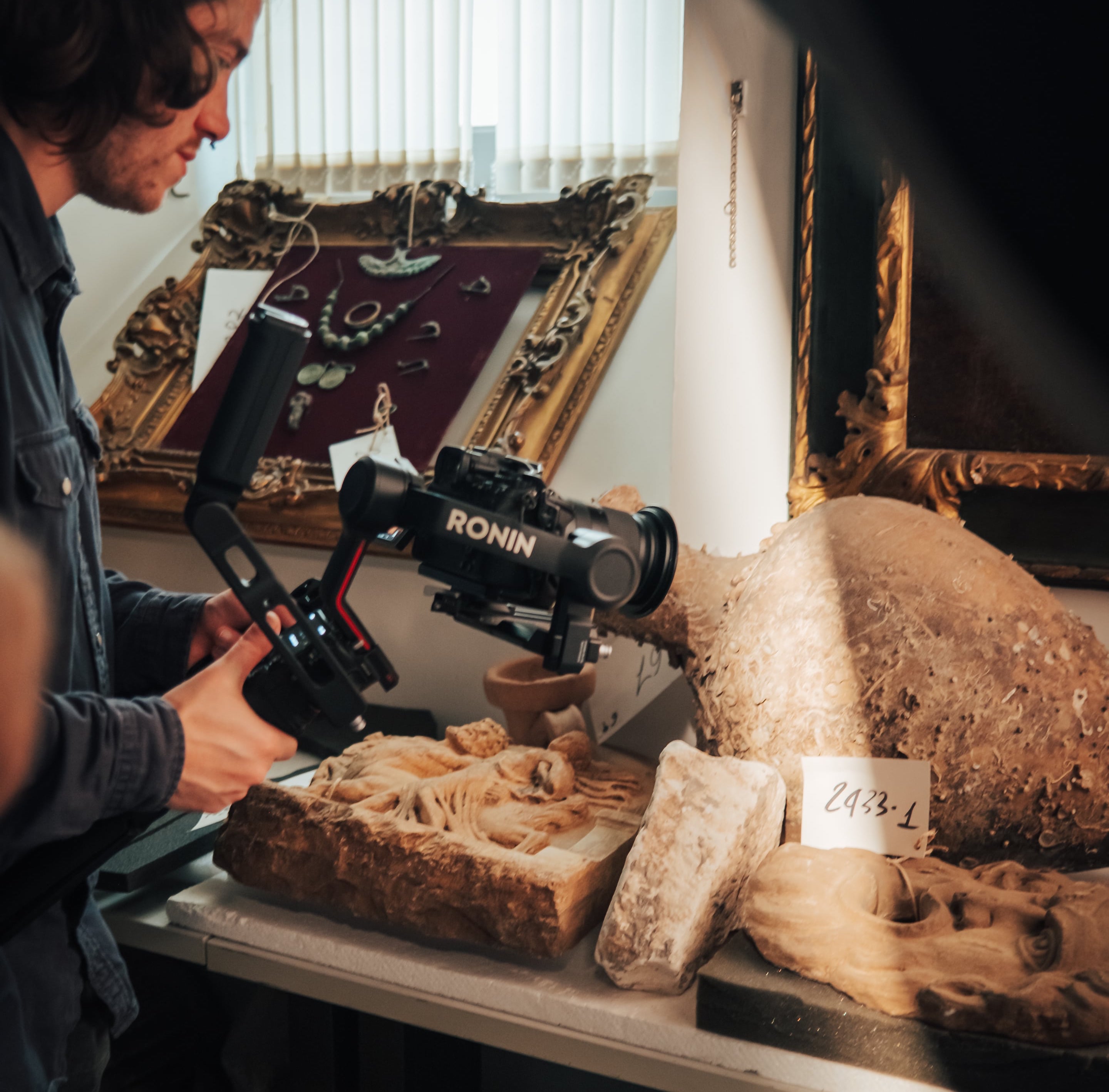
RITHMS begins filming a short film on art crime and illicit trafficking
| Fabio Beltotto | News
Last week, RITHMS Team traveled to Rome to start filming a new documentary on the illicit trafficking of cultural heritage. This production brings together museums, institutions, and Law Enforcement to examine the impact of cultural crimes on a global scale. The documentary will review past efforts to combat illegal trafficking and explore how new technologies are shaping the future of cultural heritage protection.
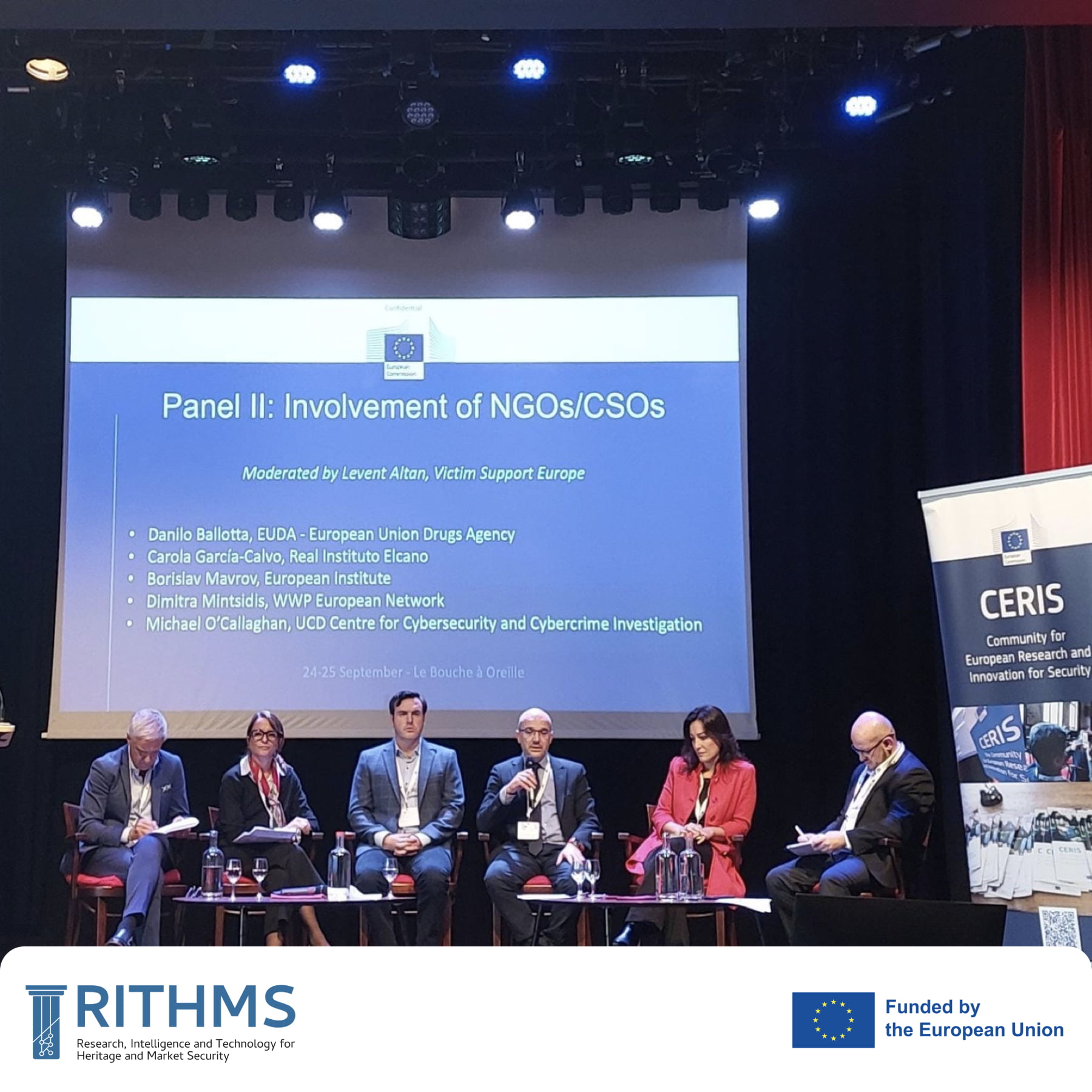
RITHMS Takes the Stage at DG HOME's CERIS Annual Event on Research for Fighting Crime and Terrorism
| Fabio Beltotto | News
On 24-25 September 2024, DG HOME organised the annual CERIS event dedicated to research for fighting crime and terrorism, uniting practitioners, policymakers, researchers, civil society representatives, and industry experts. The first day focused on online harms, exploring current trends, future technologies, and the implications of the AI Act on combating online crimes. The second day addressed the challenges faced by police authorities, NGOs/CSOs, and forensic institutes in participating in security research consortia, fostering discussions on best practices and enhancing collaboration at the European level.
Dr. Borislav Mavrov, Programme Director at the European Institute (EI) and one of the NGO partners in the RITHMS consortium, presented insights on the critical role of NGOs and Civil Society Organisations in security research projects. He emphasized their significant contributions to advancing security research and ensuring broader societal impact. Dr. Mavrov highlighted the importance of collaboration among civil society organizations, law enforcement agencies, and research bodies in creating inclusive, impactful, and transparent projects that build public trust and foster acceptance. “As the security landscape evolves, the role of NGOs will remain vital in shaping the future of research and policy, as demonstrated by projects like RITHMS, which integrate the expertise of NGOs to ensure that security research is both technically robust and socially responsible”, was on of the key messages shared by RITHMS’s representative.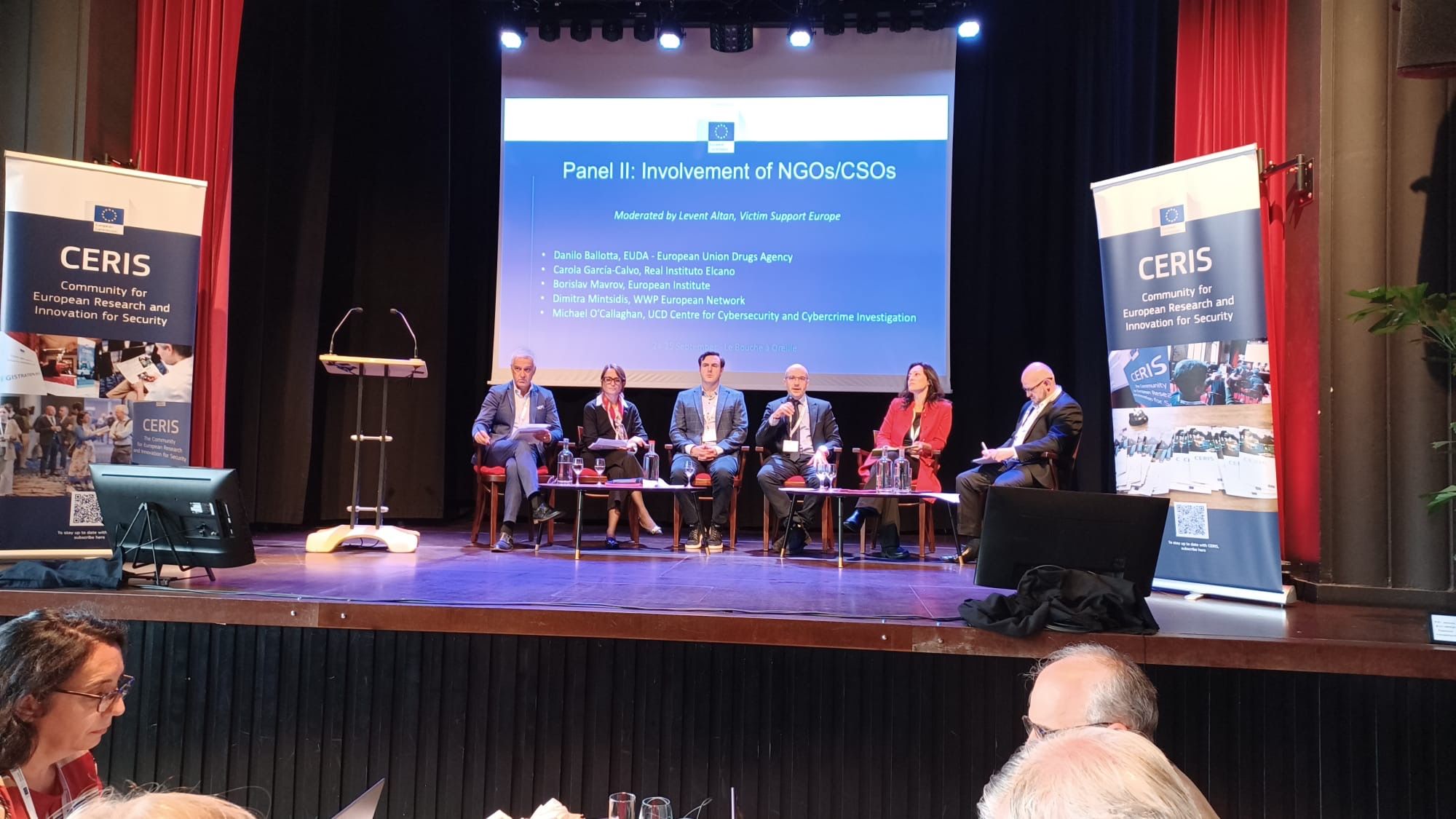
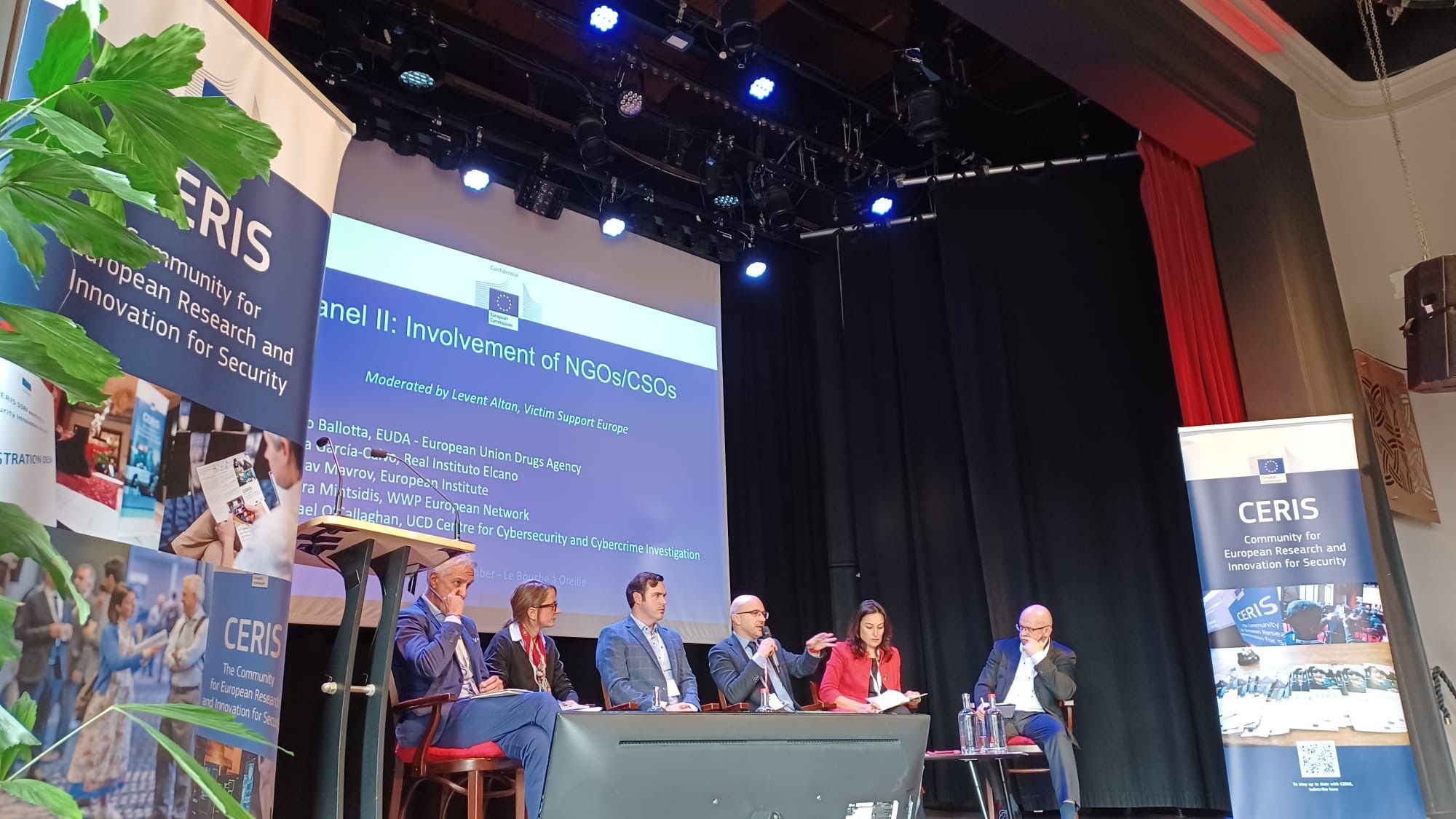
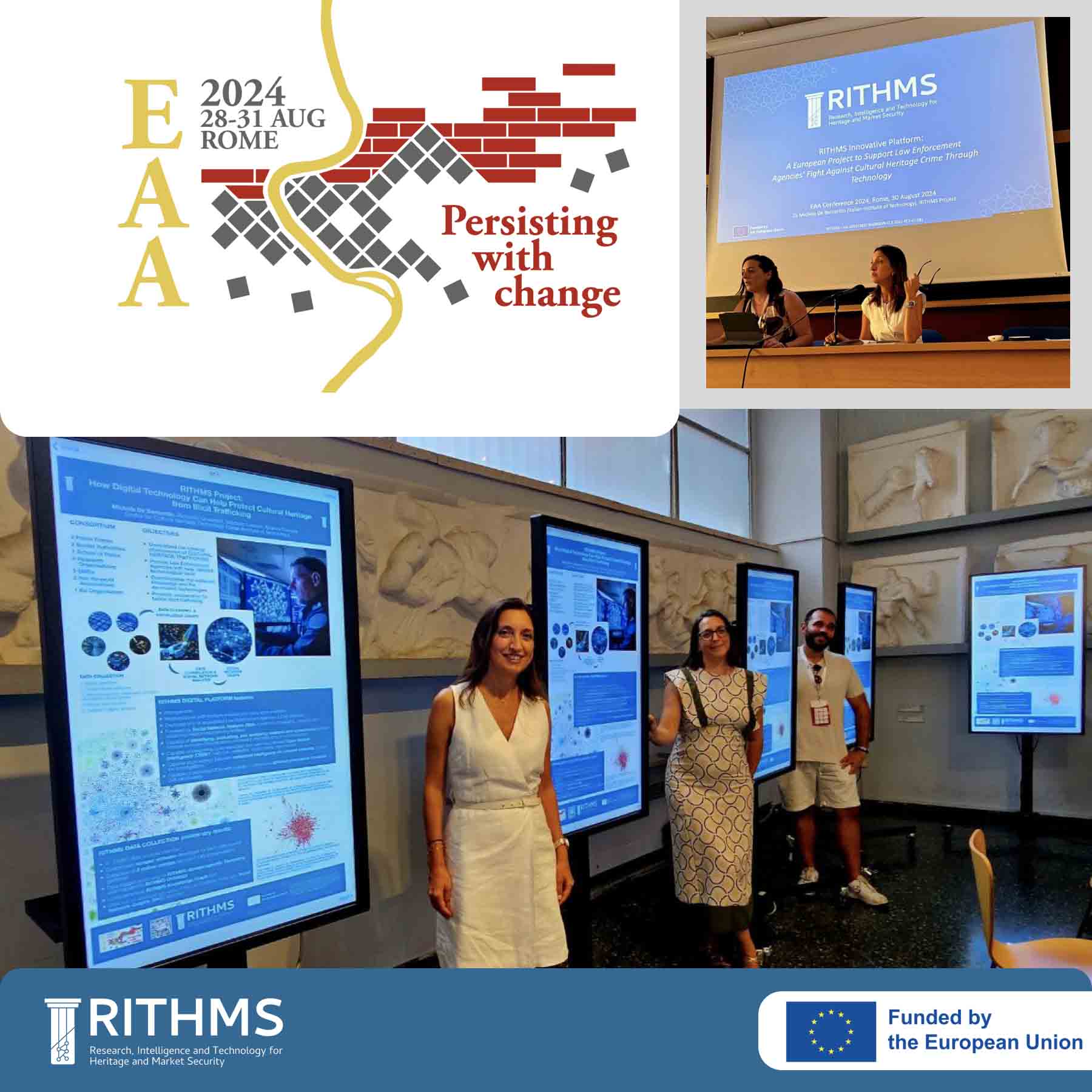
RITHMS at EAA Annual Conference 2024 - Rome, Italy
| Fabio Beltotto | News
RITHMS was prominently featured at the European Association of Archaeologists (EAA) Annual Meeting in Rome.
From August 28th to 31st, RITHMS took center stage during the session "Tracing & Protecting: Facing the Shadows of Illicit Trafficking in Cultural Goods" dedicated to addressing the urgent and complex challenges posed by the illicit trade of cultural heritage.
This session, organized within the framework of the RITHMS and DECOPE Projects, highlighted the importance of cross-disciplinary alliances in combating cultural heritage crimes. A special highlight was the presentation by our contributors from CCHT — Michela De Bernardin, Riccardo Giovanelli and Arianna Traviglia — who showcased the potential and the first results of the RITHMS Digital Platform.
This innovative platform is designed to help Law Enforcement Agencies (LEAs) tackle the illegal trafficking of cultural goods. It’s a powerful tool that leverages Social Network Analysis (SNA) to map and analyze relationships between individuals and organizations involved in these crimes. The platform turns information into actionable intelligence by connecting the dots between data from social media, websites, and other sources. This helps track down stolen cultural treasures and prevent their illicit trade.
Some impressive early results include identifying 47 key open-source data sources and creating a database with 2 million entities. We’ve developed custom tools to scrape and analyze this data, building a comprehensive knowledge graph that maps out connections within the criminal world.
Find the RITHMS Poster: How Can Digital Technology Protect Our Cultural Heritage?
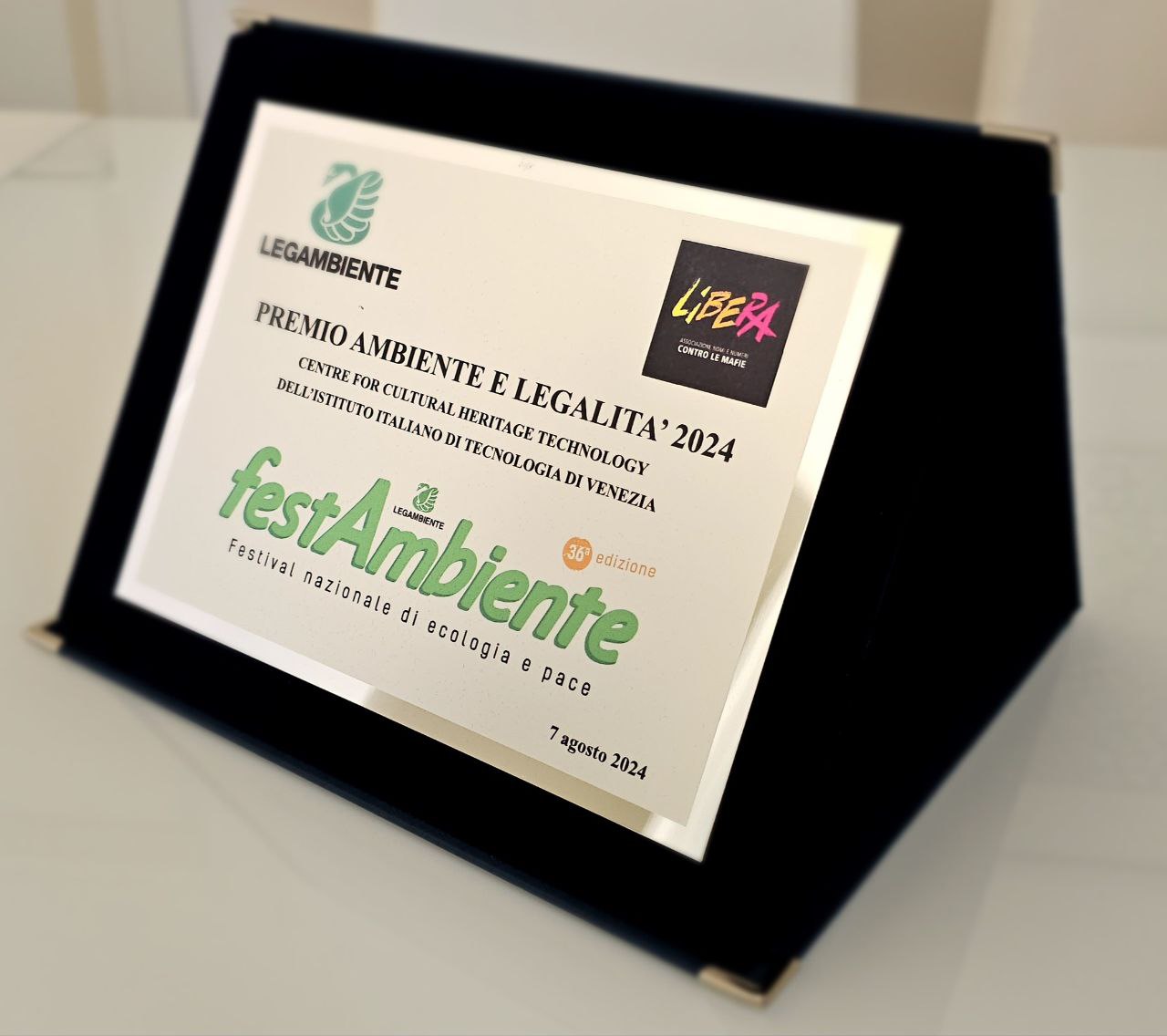
CCHT, leading the RITHMS project, receives the "Environment and Legality" Award
| Fabio Beltotto | News
Last week, the Centre for Cultural Heritage Technology (Istituto Italiano di Tecnologia - IIT), which coordinates the RITHMS project, was honored with the prestigious "Environment and Legality" award by the Italian national organization Legambiente.
This recognition is given to entities and organizations that stand out for their commitment to environmental protection and the promotion of legality, including efforts against criminal organizations involved in cultural goods trafficking.
One of the key reasons for this award was CCHT's involvement in developing support systems, including the use of artificial intelligence, to assist law enforcement agencies—work that has been a significant part of the RITHMS project. The contribution of the RITHMS project was also highlighted in Legambiente's report "Ecomafia 2024: The Stories and Numbers of Environmental Crime in Italy" which marks the 30th anniversary of its first publication. The report's data were presented in July in Rome in the presence of various authorities.
Arianna Traviglia, the project coordinator, accepted the award on behalf of CCHT, in the presence of Eugenio Giani, President of the Tuscany Region, and Stefano Ciafani, President of Legambiente.
Learn more about Legambiente's environmental crime report here (Italian version): Ecomafia 2024: The Stories and Numbers of Environmental Crime in Italy
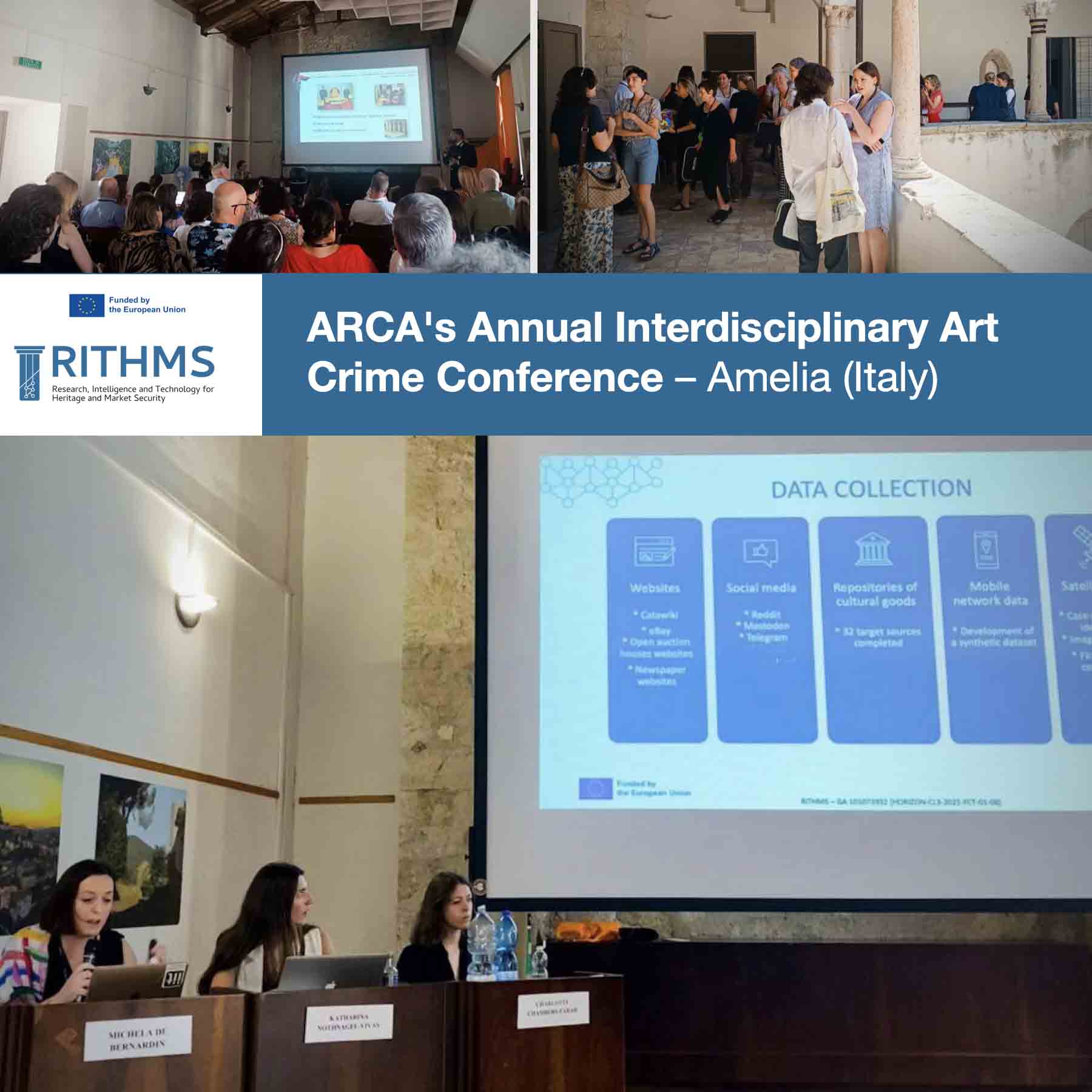
RITHMS at ARCA's Annual Interdisciplinary Art Crime Conference
| Fabio Beltotto | News
Amelia, Italy – RITHMS participated in the 13th edition of ARCA's Annual Interdisciplinary Art Crime Conference, hosted in the historic city of Amelia. Organized by the Association for Research into Crimes against Art (ARCA), this annual conference brings together experts, researchers, and professionals to explore challenges and innovative solutions in combating art and cultural crime. It serves as a pivotal platform for sharing knowledge and developing collaborative strategies to safeguard global cultural heritage.
During the conference, Michela De Bernardin from the Center for Cultural Heritage Technology delivered a presentation titled “Fighting Illicit Trafficking in Cultural Goods: RITHMS SNA-based Platform as an Innovative Tool to Dismantle Criminal Networks”. Her presentation provided an update on the development of the RITHMS project, focusing on completing the data collection phase and applying Social Network Analysis (SNA) to the gathered databases.
Michela De Bernardin explained how RITHMS utilizes SNA to analyze relational patterns and human behaviors, enabling the identification and dismantling of criminal networks involved in trafficking cultural goods. She presented several examples of SNA applications using data collected by the CCHT, demonstrating how this technology enhances investigators' capabilities to combat trafficking effectively.
The recently concluded data collection phase represents a significant milestone for RITHMS, consolidating a wealth of information from diverse sources. Preliminary results, currently in publication, underscore the potential of the RITHMS platform to provide detailed and operationally valuable insights into criminal networks.
Furthermore, by examining the mechanisms driving illicit cultural artifact trade and its connections to other criminal activities, alongside pioneering technological innovations, RITHMS charts a replicable strategy to confront these challenges. RITHMS not only deciphers the complexities of cultural goods trafficking but also offers a blueprint for a comprehensive and adaptable approach to address similar criminal phenomena.
The conference also featured participation from RITHMS Consortium Partners, including representatives from the Italian Carabinieri Command for the Protection of Cultural Heritage (TPC), the Spanish Brigade for the Historical Heritage and the National Police of Netherlands.
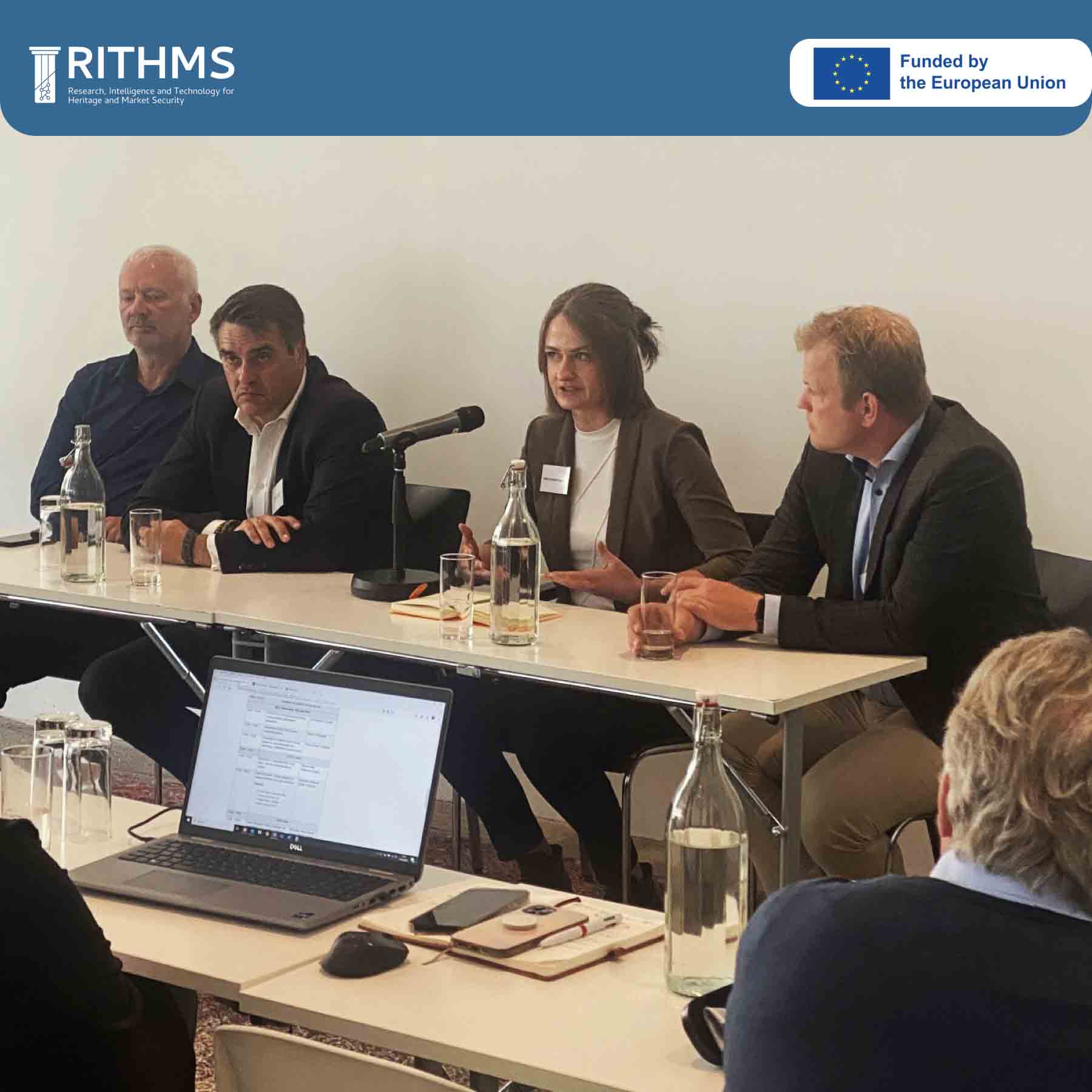
RITHMS at the Final Event of the TRACE Project
| Fabio Beltotto | News
Dr. Madison Suzanne Leeson from the Centre for Cultural Heritage Technology (IIT - Istituto Italiano di Tecnologia) recently represented RITHMS at the final event of the TRACE project conference in Vienna on June 11-12.
The TRACE project, funded by H2020 EU, has been at the forefront of developing an innovative platform that consolidates data on logistics, communications, and financial transactions. TRACE has achieved significant advancements by leveraging AI for entity extraction and efficient data processing.
At the conference, key discussions revolved around anti-money laundering mechanisms, tools for countering the financing of terrorism, and updates to evidence admissibility rules in court—topics that resonate strongly with RITHMS' goals.
Dr. Leeson participated in the panel titled “Factors Affecting the Uptake of AI Tools in the LEA Community.” Tobias Mattes joined her from the Bavarian Police (RITHM Consortium Partner) and other esteemed panelists: Peeter Paisuots from the Estonian Tax and Customs Board, and Thomas Havranek from CIN Consult Group.
Dr. Leeson shared insights from RITHMS, highlighting our efforts to integrate diverse data sources and ensure the practical utility of our mechanisms for Law Enforcement Agencies (LEAs).
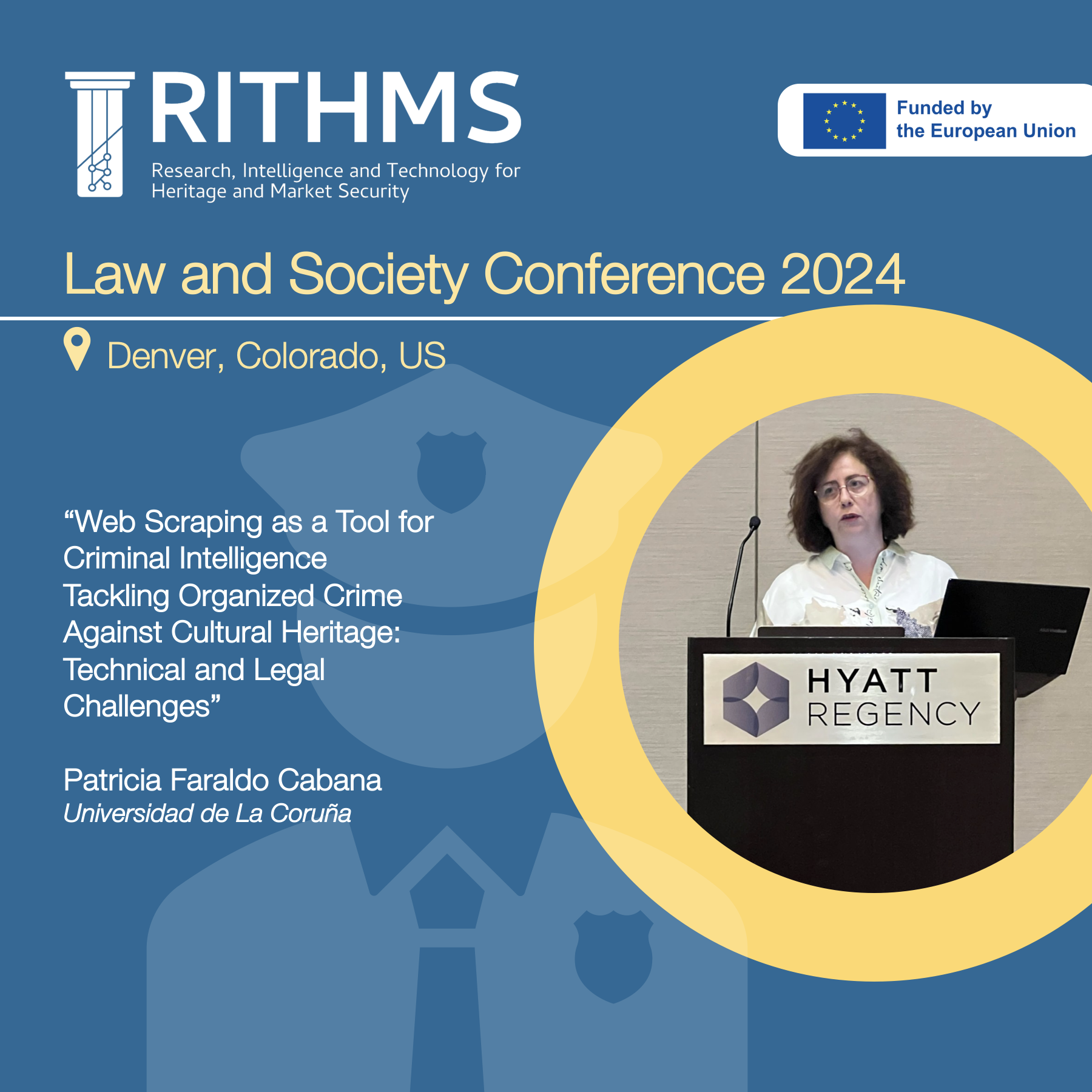
RITHMS at Law & Society Conference 2024
| Fabio Beltotto | News
Last Saturday, RITHMS participated in the Law and Society Conference 2024 (LSA) in Denver, Colorado.
Dr. Patricia Faraldo Cabana, from the University of A Coruña (RITHMS Consortium Partner), presented her paper: “Web Scraping as a Tool for Criminal Intelligence Tackling Organized Crime Against Cultural Heritage: Technical and Legal Challenges”
Abstract
Law enforcement agencies in the EU are using various tools to automatically retrieve data from social media and other open sources available on the Internet, often referred to as web scraping, when conducting investigations against organized forms of crime, including trafficking of cultural goods. Extracting knowledge from big amounts of data through web scraping is used to understand links between individuals within complex, rapidly evolving interactive criminal networks. IA-based tools using social network analysis can not only identify individuals who were not previously on the radar of LEAs, strategically hot-spotting people of interest, but they are also capable of revealing significant insights into the dynamics of criminal acts. However, the legal requisites of using them to collect data are not well known. Failure to pay attention to this aspect may result in the violation of fundamental rights and the unacceptability of the collected evidence in court. The primary contribution of this paper is to clarify the EU legal framework to enhance LEAs' capacity to successfully tackle crime without jeopardizing citizens' rights. At the same time, this paper contributes to scholarly discussions about the legal limits of web scraping and the organized nature of heritage crime.
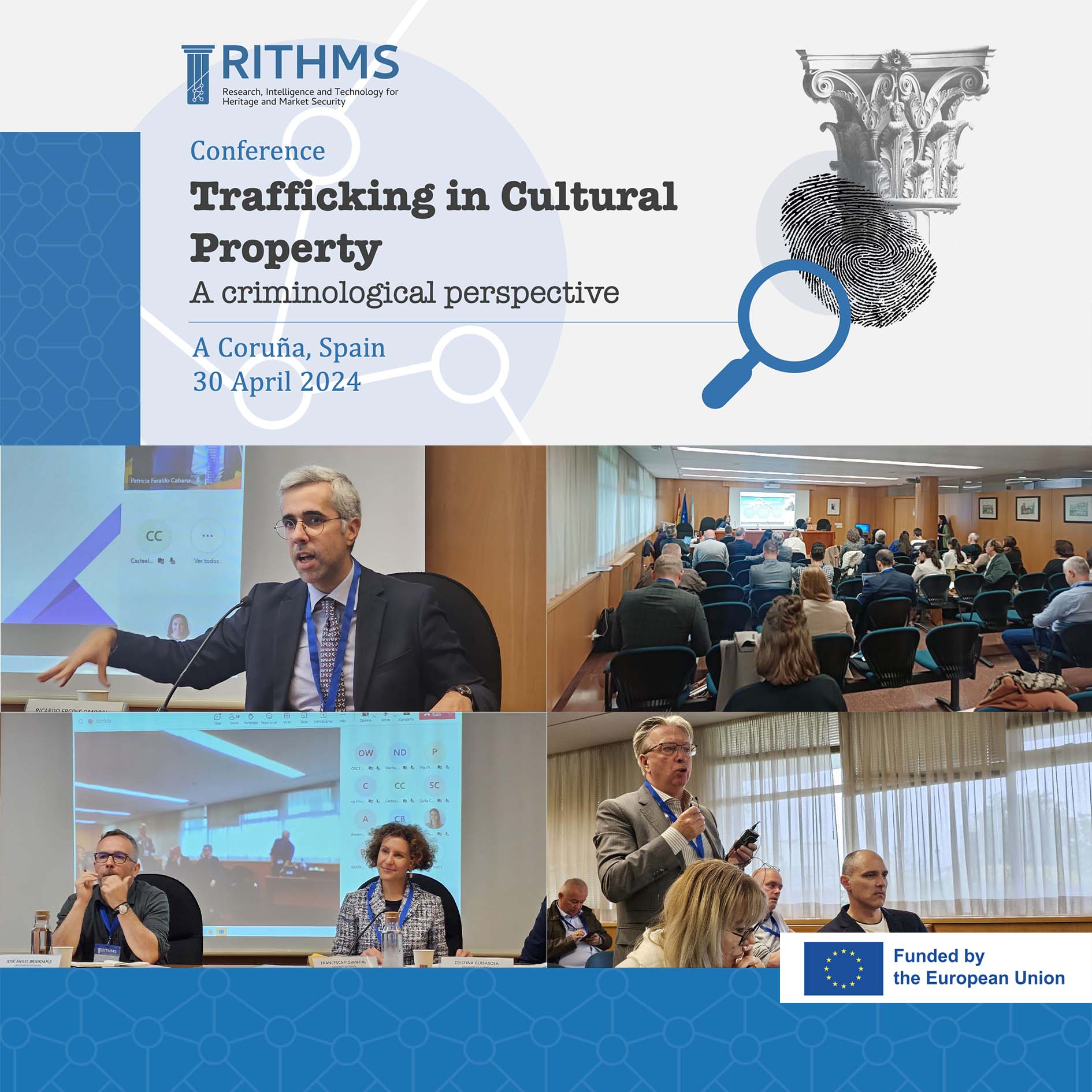
RITHMS Conference in A Coruña
| Fabio Beltotto | News
The RITHMS conference, focused on "Trafficking in Cultural Property: A Criminological Perspective" convened to address pressing issues surrounding illicit activities in the cultural sphere. Distinguished professionals and experts gathered to share insights and strategies to combat the trafficking of cultural goods.
Delving into the intricate realm of illicit cultural goods trafficking, the morning sessions were enriched by the expertise of Marc Balcells from the Universitat Oberta de Catalunya. Esteemed panelists including Cristina Guisasola (Universitat de València), Francesca Fiorentini (Università degli Studi di Trieste), and José Ángel Brandariz (Universidade da Coruña) furthered our understanding of this multifaceted issue through engaging round table dialogues.
Kicking off the subsequent session, John Kerr from the University of Law illuminated best practices in heritage and cultural property policing, drawing from international police operations in France, Italy, the UK, and Brazil. This session was marked by a dynamic exchange featuring representatives from LEAs of the RITHMS Consortium, such as Richard Bronswijk (Politie, The Netherlands), Silvia Valencia Juez (Policía Nacional, Spain), Luca Migliaccio (Arma dei Carabinieri Comando Tutela Patrimonio Culturale, Italy) and Paula Mita (Romanian Police). Cameron Walter from the Organization for Security and Co-operation in Europe (OSCE) concluded this session with invaluable closing remarks.
The afternoon session, inaugurated by Arianna Visconti (Università Cattolica del Sacro Cuore), delved into the intricate nexus between illicit trafficking of cultural goods and organized crime. Key themes such as online cultural crimes, trafficking in the Mediterranean, and the role of the Nicosia Convention in criminal justice were explored during engaging round table discussions.
Special recognition is due to Sam Hardy (University of Oslo), Riccardo Ercole Omodei (Università degli studi di Palermo), Antonio Roma, and Oscar Alarcón-Jiménez (Council of Europe) for their significant contributions.
From enlightening keynotes to dynamic round table discussions, each session deepened our understanding and underscored the imperative for collaborative action. Special thanks to all our speakers for their invaluable contributions in safeguarding our global cultural heritage.
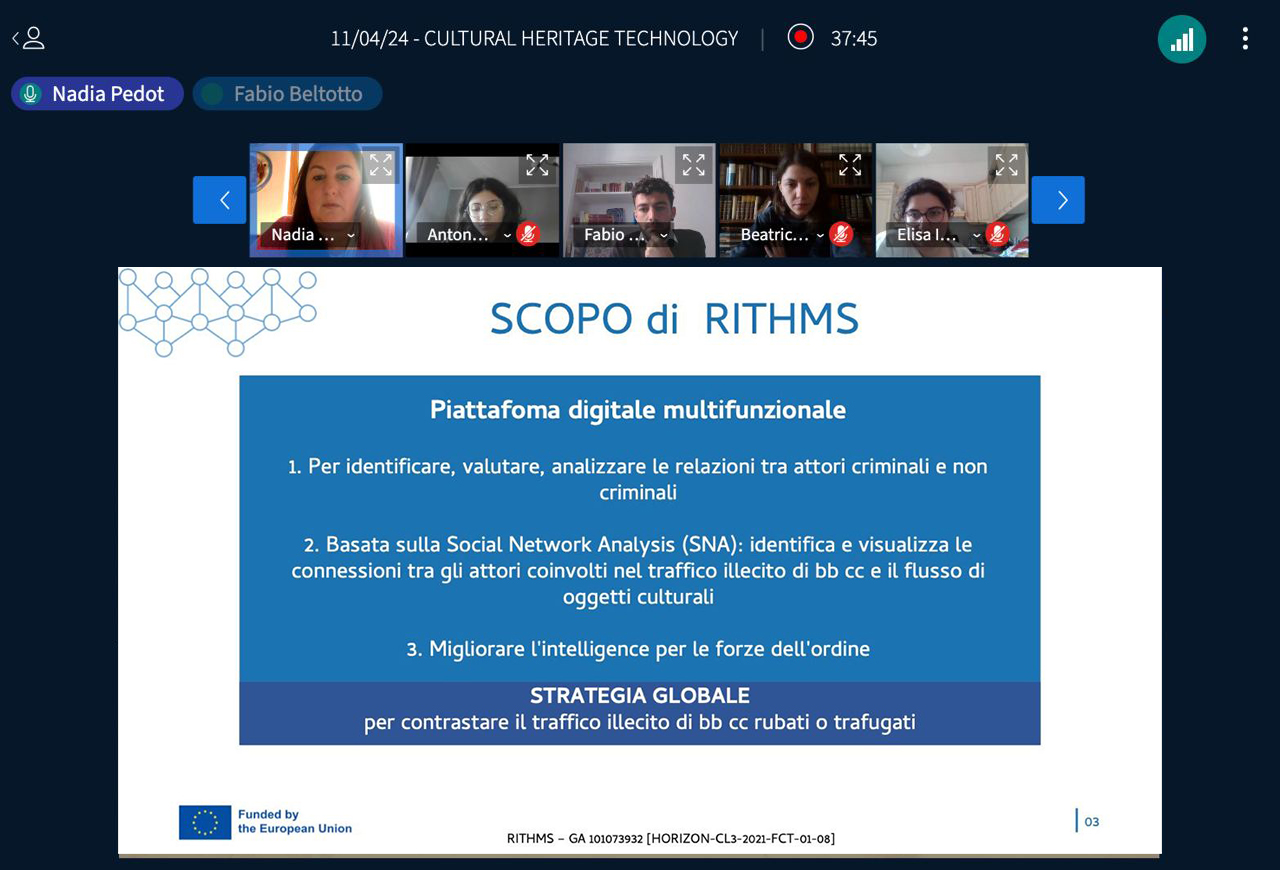
RITHMS at Treccani Accademia
| Fabio Beltotto | News
Yesterday, RITHMS Project Coordinator, Centre for Cultural Heritage Technology, had the pleasure of leading a class focused on combating the illicit trafficking of cultural goods within the Master program of Art and Cultural Heritage Management at Treccani Accademia.
In collaboration with the Art Crime Project (ACP) and the The Journal of Cultural Heritage Crime, RITHMS affiliated partners, the session comprehensively explored the complexities of theft, clandestine excavations, and the online art market.
The insights shared by our speakers, Nadia Pedot, Daniela Rizzo, Michela De Bernardin, Riccardo Giovanelli, Serena Epifani, and Fabio Beltotto, have illuminated key aspects of these issues, from preserving antiquities in conflict zones to raising awareness about cultural crime, paving the way for informed action and advocacy.
In an exciting development, RITHMS has initiated a project work with Accademia's talented students. Together, we'll be crafting communication and dissemination materials to empower galleries, museums, and art professionals to join us in the fight against illicit trafficking.
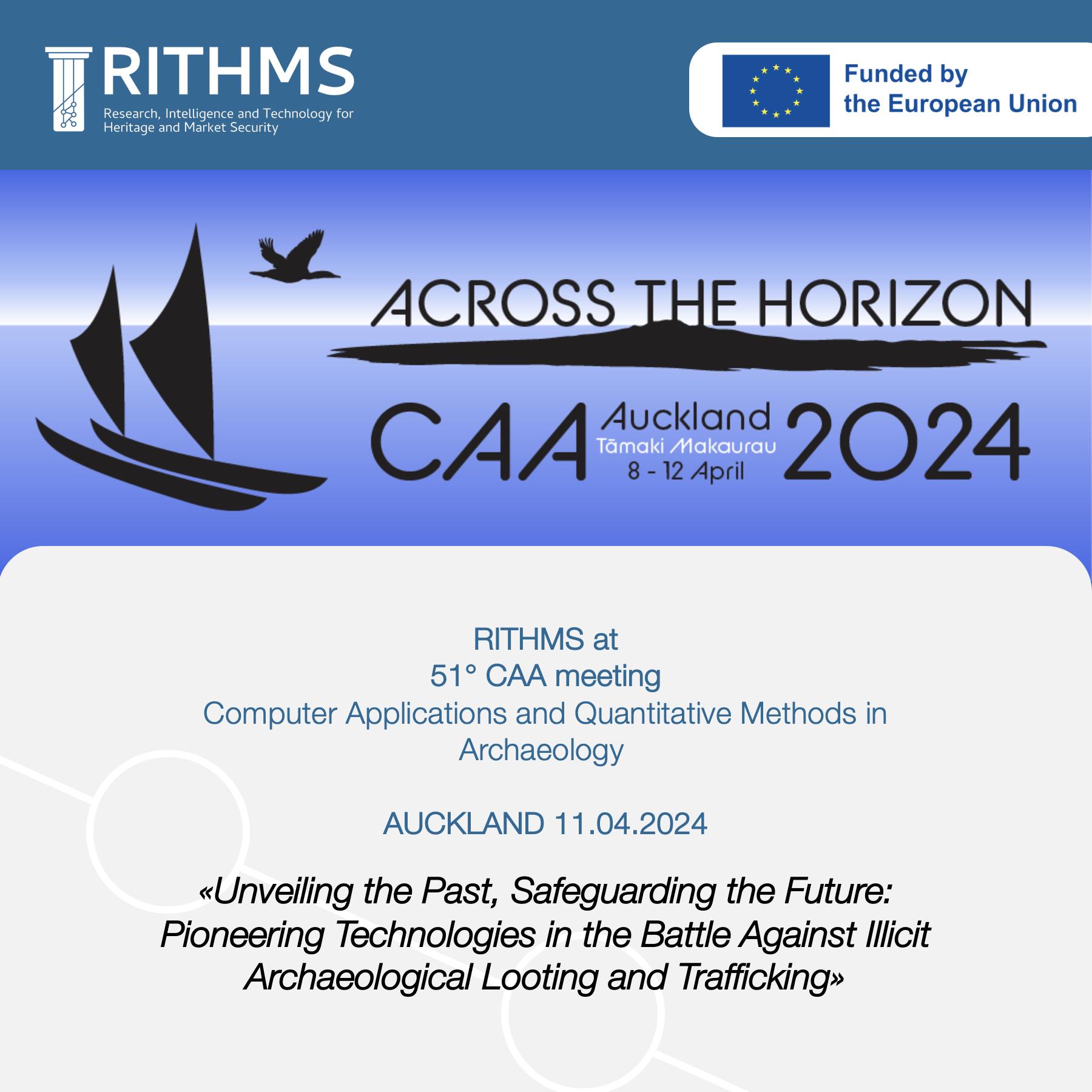
RITHMS at CAA 2024
| Fabio Beltotto | News
RITHMS Session at CAA2024!
Run today, within the 51th meeting of CAA taking place in Auckland (New Zealand), the session "Unveiling the Past, Safeguarding the Future: Pioneering Technologies in the Battle Against Illicit Archaeological Looting and Trafficking", fostered by RITHMS project.
During our session, we delved into technological applications developed to fight the urgent global issues of illicit trafficking and cultural heritage crime. Our roundtable discussions explored innovative approaches to combat and prevent the phenomenon.
The session was an inclusive platform, welcoming researchers and professionals from diverse backgrounds and embracing both traditional and computational methodologies.
Thank you to all who participated in shaping the future of cultural heritage protection!
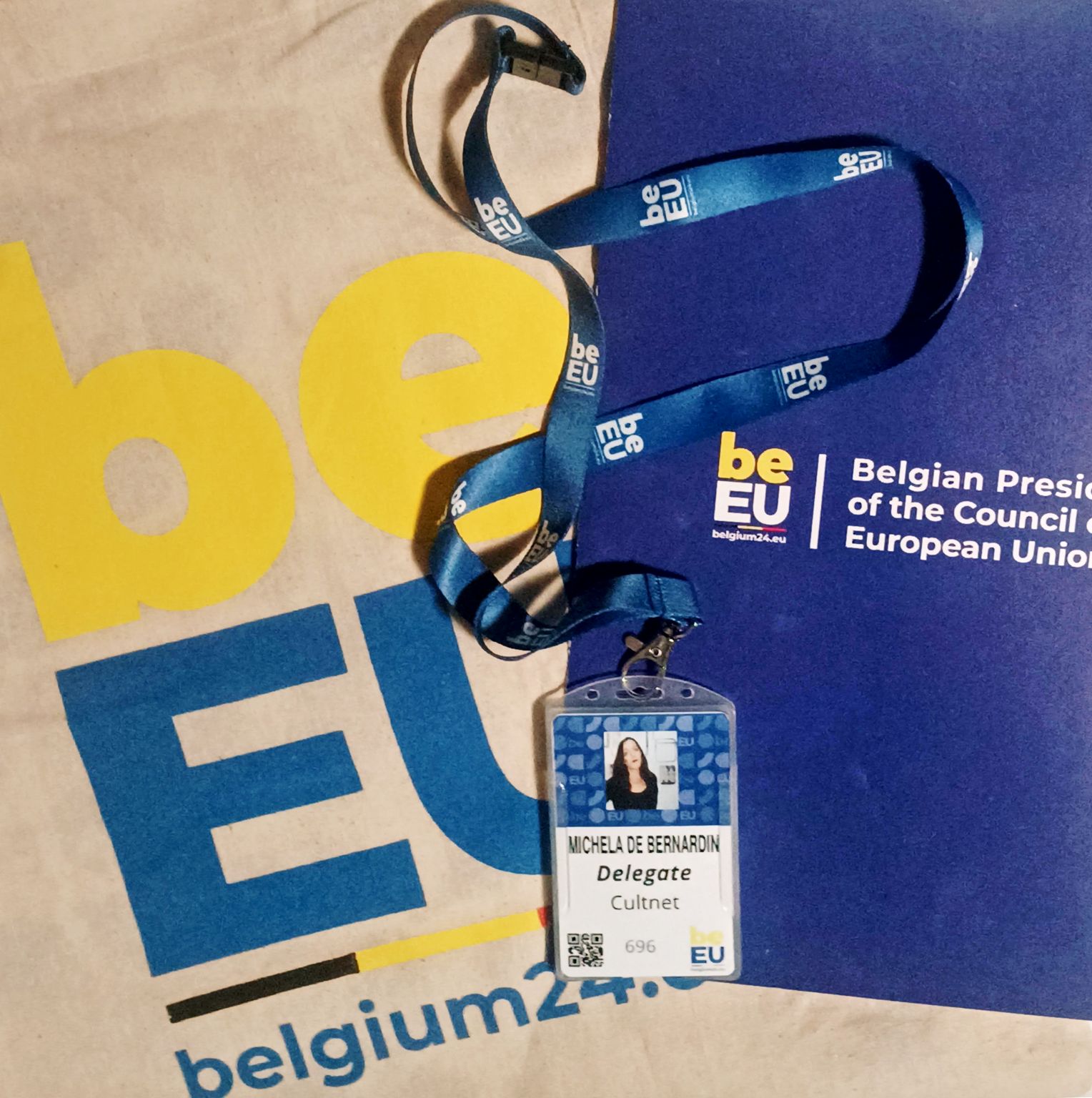
RITHMS at CULTNET Meeting in Brussels
| Fabio Beltotto | News
As part of Belgium's presidency of the EU, this convention was organised by the Belgian Federal Police with the Belgian General Administration of Customs and Excises and the Belgian Ministry of Economic Affairs.
Established by the EU Council in 2012, CULTNET is an informal network of authorities and experts involved in the prevention and fight against crime targeting cultural property.
Boosting the collaboration among stakeholders at national and international levels, the convention involved both national police forces and international institutions (such as the European Commission, the World Customs Organization, INTERPOL, Europol, International Council of Museums (ICOM) etc.) engaged in countering the phenomenon of illicit trafficking in cultural goods.
Animated discussions and workshop activities focused especially on the importance of cross-border and cross-force cooperation and the pivotal role of digital platforms and databases (like INTERPOL’s “Stolen Works of Art Database” with IDArt mobile App and the forthcoming “Platform for the Import, Export, and Restitution of Cultural Property”) as tools to support LEAs work in safeguarding cultural heritage.
RITHMS SNA Platform will be another key tool available to LEAs in the future in synergy with already existing ones.
A warm thanks to Christine C. for the kind invitation.
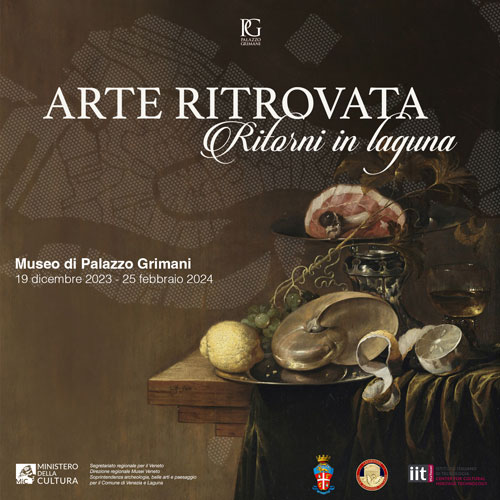
RITHMS co-participated in the exhibition "Arte Ritrovata. Ritorni in Laguna"
| Fabio Beltotto | News
The exhibition will be hosted from December 19, 2023, to February 25, 2024, at the Museum of Palazzo Grimani, Venice (Italy), organized by the Segretariato Regionale per il Veneto of the Italian Ministry of Culture together with the Direzione Regionale Musei Veneto, in partnership with the Soprintendenza Archeologia, belle arti e paesaggio per il Comune di Venezia e Laguna, and in collaboration with the Arma dei Carabinieri Command for the Protection of Cultural Heritage and the Istituto Italiano di Tecnologia - Centre for Cultural Heritage Technology, both members of the RITHMS Consortium.
The exhibition offers an opportunity to explore various episodes related to the recovery and restitution of cultural heritage, highlighting the commendable collaboration between the Carabinieri TPC and the various bodies of the Italian Ministry of Culture operating in the metropolitan area of Venice. The showcase will illustrate various types of offenses – from forgery to illicit export, clandestine excavations to fraud – emphasizing the work of recovery, restitution, and protection carried out by the Carabinieri TPC Venice Unit.
It will represent also a chance to understand the protective procedures implemented by the Italian Ministry of Culture in synergy with the Carabinieri TPC Venice Unit, leading up to the enhancement of the recovered assets. The exhibition will display archaeological artifacts from various eras and origins, as well as modern paintings. Original pieces will be accompanied by a series of forgeries, presented in a setup that encourages visitors to engage in comparison and curious scrutiny, inviting them to observe the artworks while empathizing with the professional figures who facilitated their recovery.
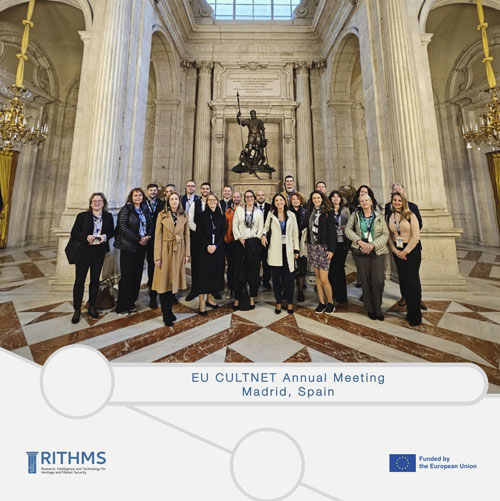
RITHMS at CULTNET Annual Meeting
CULTNET, an Informal Network of Law Enforcement Authorities and Experts Competent in the field of cultural goods, recently organized this year's gathering in Madrid from the 24th to the 26th of October, 2023. This event, hosted during the Spanish Presidency of the Council of the European Union, brought together industry experts and institutions devoted to preserving our cultural heritage. Notable members of CULTNET include the European Commission, Europol, and INTERPOL.
The primary focus of this year's meeting was addressing the challenges of crimes against cultural heritage in Spain, with a special emphasis on fostering collaboration among various institutions engaged in this important endeavor. A significant spotlight was also placed on the protection of cultural heritage in conflict zones, particularly focusing on the cultural heritage of Ukraine.
Law enforcement agencies from across Europe gathered to share their experiences in combating the illicit trafficking of cultural treasures and art-related crimes. Three key RITHMS partners took center stage:
- The Brigade of Cultural Heritage of the Spanish National Police, chair and organizer of this year's CULTNET meeting, shed light on the "Leona" operation, revealing the case of clandestine excavations and the illicit sale of Iberian artifacts.
- The Carabinieri of the Italian Cultural Heritage Protection Unit showcased the "Artemis" operation.
- The Dutch Police led the discussion on the future development of the CULTNET network.
Dr. Arianna Traviglia, Director of the Centre for Cultural Heritage Technology (Istituto Italiano di Tecnologia) and Project Coordinator for RITHMS, presented the project's goals and current activities. She discussed how RITHMS can evolve into a vital tool for law enforcement agencies in the ongoing fight against the illicit trafficking of cultural goods.
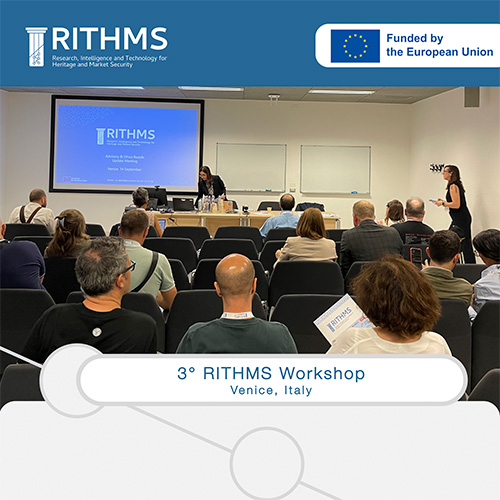
RITHMS Third workshop
| Fabio Beltotto | Workshop
In a pivotal moment for the RITHMS project, the 3rd internal workshop unfolded over two days, showcasing significant progress in the ongoing battle against organized crime's grip on cultural heritage. The event took place at the Centre for Cultural Heritage Technology in Venice.
Day 1 - Delving into Milestones and Strategies
The first day of the workshop centered around the presentation of all deliverables completed in the project's inaugural year. Attendees included RITHMS' Project Officer and members of both the Advisory and Ethics Boards.
Participants engaged in deep discussions regarding the achievements and hurdles encountered during the project's initial year. Valuable insights and best practices were exchanged, setting the course for future endeavors. The unwavering commitment to combating organized crime's impact on cultural heritage was evident throughout the day, reinforcing the project's vital mission.
Day 2 - Exploring the Nexus of Organized Crime and Cultural Heritage
Day two of the workshop marked a resounding success, with participants actively engaging in discussions and dedicating themselves to the cause. The workshop's focus was to delve into the intricate links between organized crime and cultural heritage.
Each contribution made during this session laid the foundation for the months ahead, as RITHMS members work to uncover solutions to this pressing issue. The insights, research findings, and discussions shared during the workshop will serve as invaluable resources in the ongoing fight to safeguard cultural heritage.
The RITHMS project extends heartfelt gratitude to its advisors, including the Council of Europe, UNIDROIT Foundation, OSCE, and Europol, for their unwavering support and collaboration.

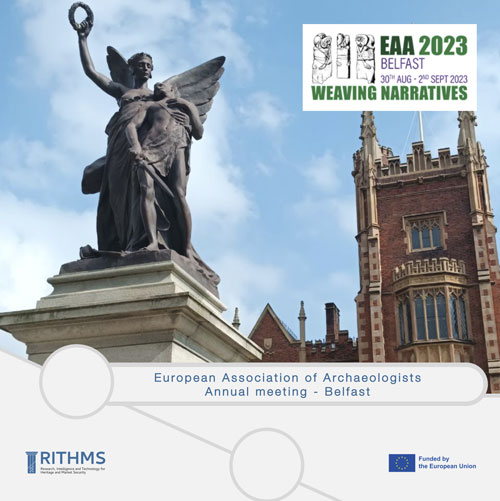
RITHMS at EAA Conference in Belfast
| Fabio Beltotto | News
Our esteemed team members, Dr. Arianna Traviglia and Dr. Michela De Bernardin (Centre for Cultural Heritage Technology - Istituto Italiano di Tecnologia) had the honor of serving as session chairs alongside Dr. Marianne Mödlinger at the EAA23 Weaving Narratives conference in Belfast, Ireland.
The session they led, titled "REPOSITORIES AND DATASETS AS OPERATIONAL TOOLS IN COUNTERING THE ILLICIT TRAFFICKING OF CULTURAL GOODS" addressed the challenges posed by looting and illicit trafficking of cultural artifacts, particularly in regions affected by conflict.
During the session, attendees had the opportunity to explore the crucial role played by databases and research activities in combating cultural heritage trafficking. Organizations such as Arma dei Carabinieri - Command for the Protection of Cultural Heritage in Italy, the French OCBC, and INTERPOL’s Works of Art Unit were highlighted for their efforts in developing databases of stolen objects. Innovative techniques like social network analysis were also discussed, revealing how they are being employed to track illicit online sales and criminal networks.
The session featured informative presentations that focused on the creation of digital repositories for archaeological goods, whether acquired, sold, or stolen, and research catalogs with clear geographic provenance. These presentations were followed by a structured discussion that encouraged participants to engage in critical dialogue, exploring effective ways to connect these datasets and make them accessible to law enforcement experts.
This session was organized within the framework of the RITHMS_EU project, emphasizing our dedication to establishing an interoperable digital platform. This platform aims to identify organized criminal networks involved in the trade of cultural property, providing invaluable intelligence to investigators and contributing to the preservation of cultural heritage.
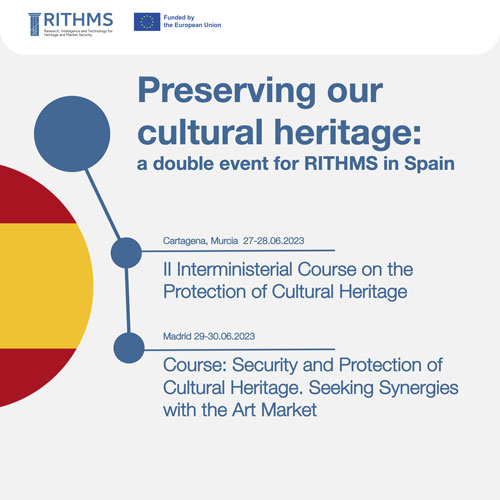
Double event for RITHMS in Spain
| Fabio Beltotto | News
In the last few days, we participated in two remarkable events, both dedicated to the preservation and protection of cultural heritage.
First Event: RITHMS Project Presentation at the II Interministerial Course on the Protection of Cultural Heritage.
We were honoured to have Silvia Valencia and Oscar Liz from the Brigade Of Cultural Heritage of the Spanish National Police, a Consortium Partner of RITHMS, deliver an insightful presentation on our project. The event, hosted by the Ministerio de Cultura y Deporte, took place at the prestigious National Museum of Underwater Archaeology Arqva in Cartagena, Murcia.
As one of the 4 police forces partnering with RITHMS, the Spanish National Police plays a vital role in protecting and preserving cultural heritage, taking charge of centralizing, coordinating, analyzing, and evaluating critical information related to our invaluable cultural treasures, as well as fostering relationships with key national and international organizations involved in cultural affairs.
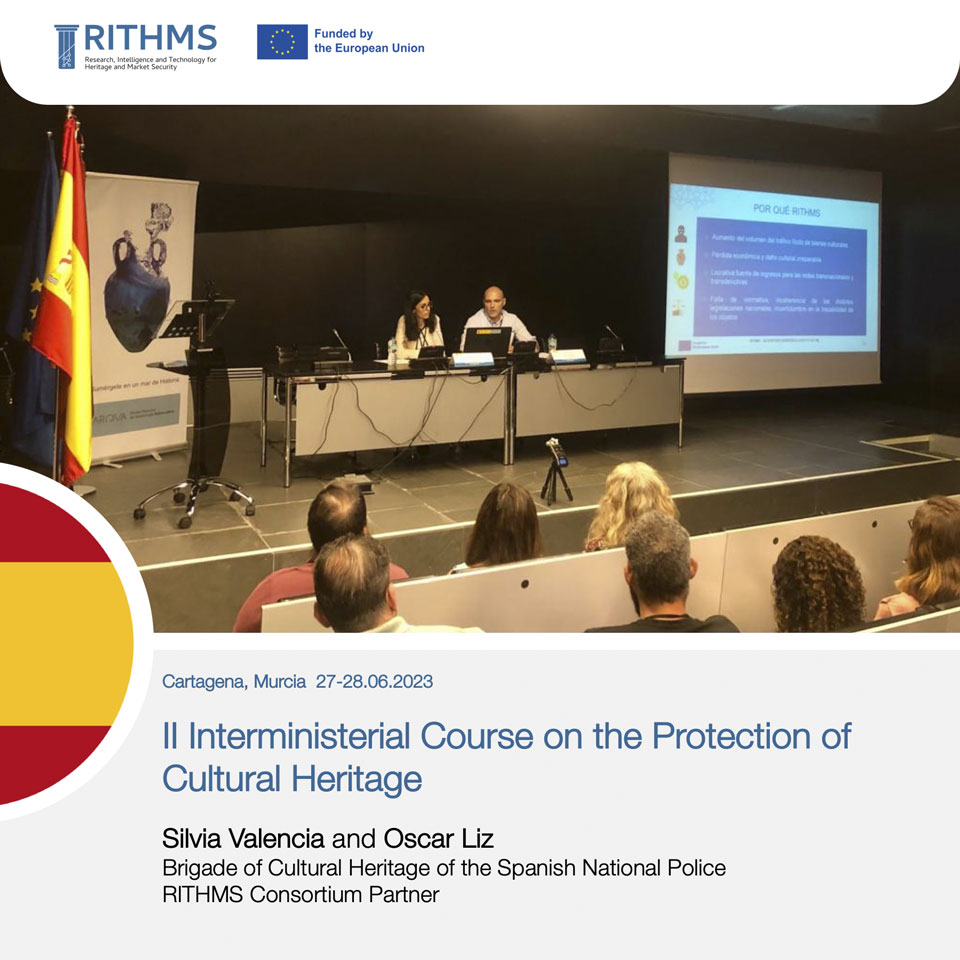
Second Event: IIT's Participation in the Course "Seguridad y protección del patrimonio cultural. Buscando sinergias con el mercado del arte" (Security and Protection of Cultural Heritage. Seeking Synergies with the Art Market).
On the 29th and 30th of June, our colleagues from the Centre for Cultural Heritage Technology (Istituto Italiano di Tecnologia), Dr. Arianna Traviglia and Dr. Michela De Bernardin, contributed to this important course in Madrid. They explored various approaches to combat the illicit trafficking of cultural goods and shared valuable insights into the ongoing RITHMS project, shedding light on its progress and future prospects.
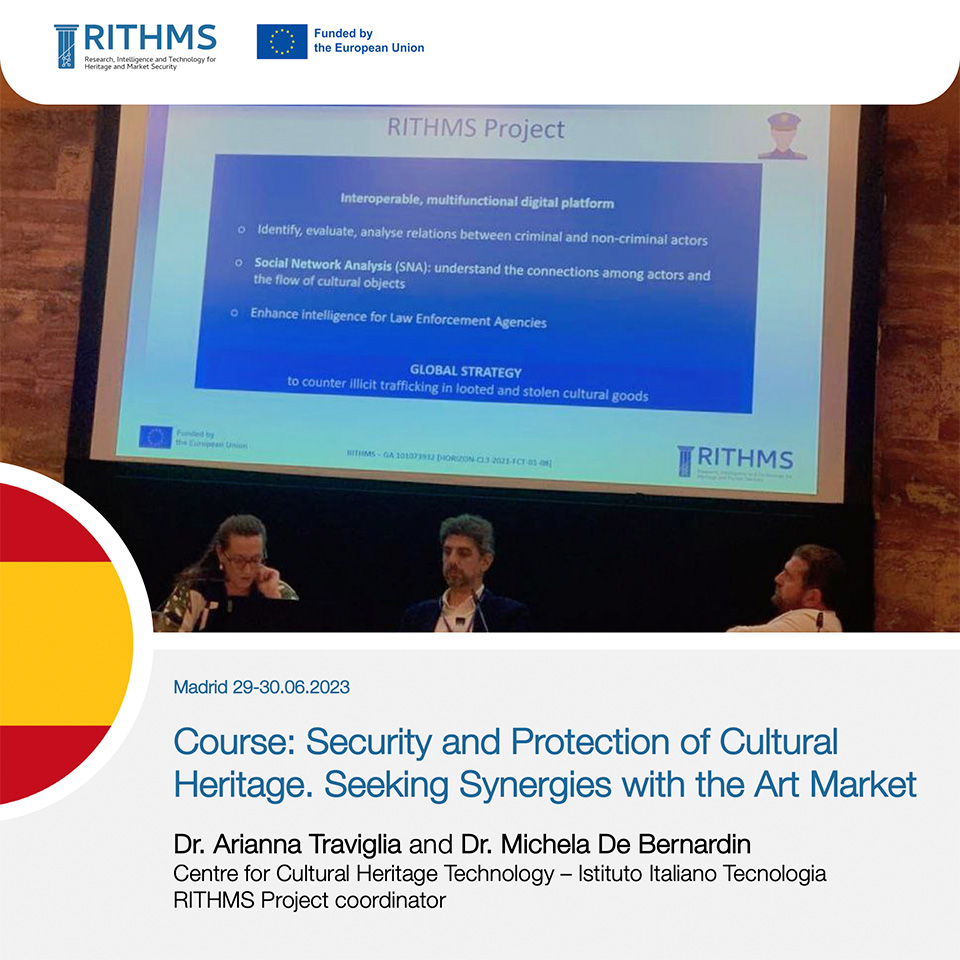
Both events provided fantastic opportunities for knowledge exchange, collaboration, and strengthening our mission to protect and preserve our rich history for the generations to come.
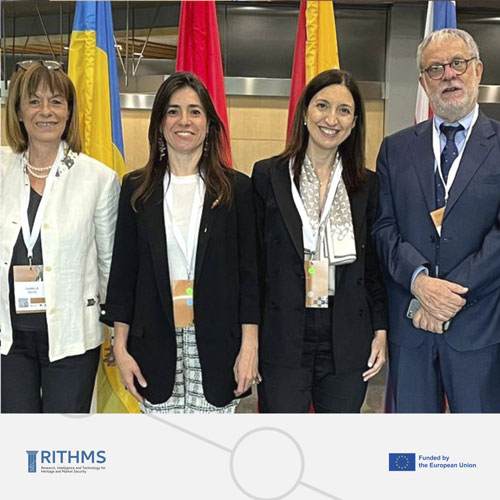
RITHMS at the International Conference on the Nicosia Convention - Riga, Latvia
| Michela De Bernardin | News
At the International Conference on the Nicosia Convention in Riga, organised by the Council of Europe, Dr Arianna Traviglia (CCHT-IIT), RITHMS Project's Coordinator, delivered an inspiring speech on the power of technology in safeguarding cultural heritage and combating looting and illicit trafficking.
In fact, RITHMS project leverages Social Network Analysis methodology to develop an advanced digital resource that enhances the capabilities of Law Enforcement Agencies in their investigations.
By mapping social connections and analysing relationships between criminal and non-criminal actors, RITHMS will provide a novel understanding of the intricate trading networks related to cultural property.
Sharing the stage with RITHMS' Coordinator, Mr Maurizio Pellegrini and Ms Daniela Rizzo, former officers of the Italian Ministry of Culture and renowned experts in judicial cases addressing looting activities at archaeological sites.
As members of the Art Crime Project Association, RITHMS Consortium's Affiliated Entity, they are also involved in the project.
Furthermore, the conference provided a valuable opportunity to meet Ms Monica Redondo Alvarez and Dr Oscar Alarcon Jimenez, Programme Managers of the Nicosia Convention and esteemed Advisory Board Members of RITHMS project.
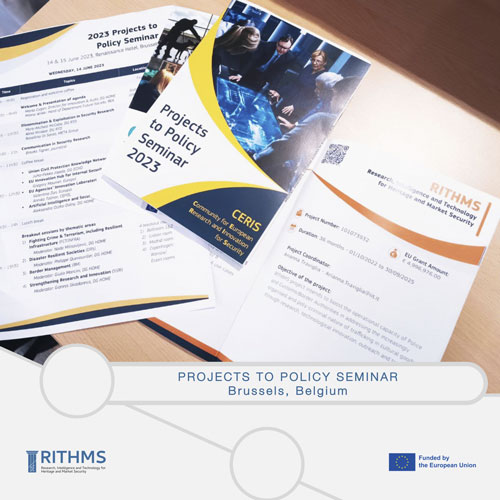
RITHMS at the Projects to Policy Seminar - Brussels, Belgium
| Fabio Beltotto | News
RITHMS has been invited to participate in the "Projects to Policy Seminar", co-organized by DG HOME and REA. This annual event brings together a collective of newly launched projects and policy stakeholders to foster collaboration, knowledge sharing, and policy alignment.
It is an incredible opportunity for RITHMS to contribute to the policy landscape and make a meaningful impact in the following fields:
Fighting Crime & Terrorism: RITHMS aims to develop innovative solutions that enhance security measures and combat criminal activities against cultural heritage.
Strengthened Security Research and Innovation: RITHMS project firmly believes in the power of research and innovation to address emerging security challenges. The project aims to advance security research, foster innovation, and contribute to cutting-edge solutions that protect cultural heritage.
Border Management: efficient and secure border management is vital for tackling the international illicit trafficking of cultural goods. RITHMS recognizes the significance of streamlined processes and enhanced security measures at borders.
One of the seminar's goals is to raise awareness among relevant policy DGs (Directorates-General) about the newly launched projects, including RITHMS. We are grateful for this opportunity to showcase our project's objectives, progress, and potential policy-related outputs. Additionally, the seminar will provide valuable guidance to these new projects, enabling them to align with the policy priorities and interests of the policy DGs.
We are excited to engage with policy stakeholders, learn from their expertise, and contribute to the policy landscape. Through collaborations like these, we can truly make a lasting impact and drive positive change.
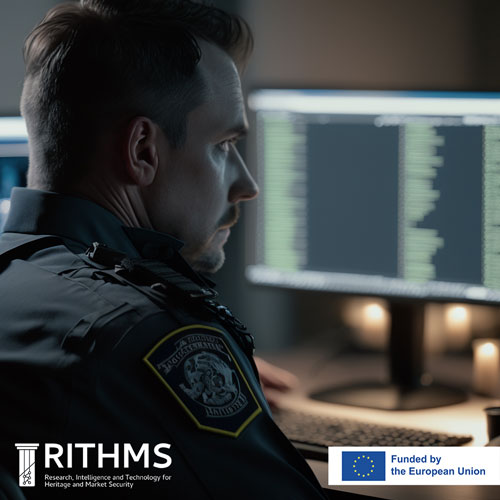
RITHMS on Border Security Report Magazine
| Fabio Beltotto | News
After the presentation at the latest 𝐖𝐨𝐫𝐥𝐝 𝐁𝐨𝐫𝐝𝐞𝐫 𝐒𝐞𝐜𝐮𝐫𝐢𝐭𝐲 𝐂𝐨𝐧𝐠𝐫𝐞𝐬𝐬 in Skopje, RITHMS project lands on the pages of the specialised magazine 𝐁𝐨𝐫𝐝𝐞𝐫 𝐒𝐞𝐜𝐮𝐫𝐢𝐭𝐲 𝐑𝐄𝐏𝐎𝐑𝐓.
Find out more here: https://www.border-security-report.com/rithms-he-project-research-intelligence-and-technology-for-heritage-and-market-security/
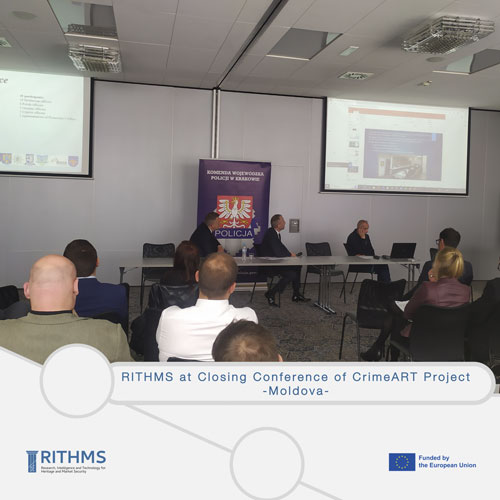
RITHMS at Closing Conference of CrimeART Project in Moldova
| Fabio Beltotto | News
On May 30th, the National Police of Moldova (RITHMS Consortium partner) presented RITHMS' objectives and main actions during the Closing Conference of the CrimeART project (Crime Against Cultural Goods and Cites).
Both projects share the common goals of enhancing investigative capabilities in crimes against cultural goods and combating organized crime through cooperation with relevant entities at national and international levels.
The knowledge acquired from five training sessions conducted within the CrimeART project, particularly regarding the methods and necessary actions for investigating cases involving cultural goods, will be exploited to further tailor the development requirements of RITHMS Platform.
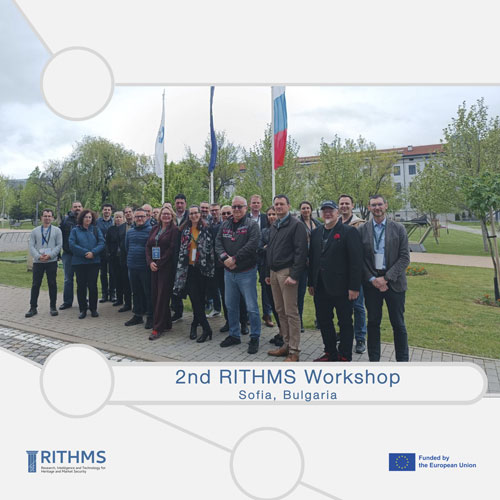
RITHMS Second Workshop
| Fabio Beltotto | Workshop
The second internal RITHMS Workshop took place in Sofia on the 9th and 10th of May.
Consortium partners have been hosted by European Software Institute - Center Eastern Europe (ESI CEE) at Cybersecurity Lab (Sofia Tech Park) for the two-day meeting.
The main focus of the workshop was the validation of the technical requirements for the development of RITHMS digital platform: parameters to be used for Data Cleaning, Data Collection and its scrapers, platform access systems, output visualization format, and the structure of three use cases were defined.
By the end of the project, Law Enforcement Agencies will be provided with a technological tool that, thanks to the SNA (Social Network Analysis) application, will allow them to combine investigative data with open source information, obtaining valuable indications on the connections between individuals and criminal groups involved in the illicit trafficking of cultural property.
The automatic integration of multiple sources of information in an interactive multi-layer graph will be strategically crucial in boosting LEAs investigations and, finally, contrasting this phenomenon more effectively.
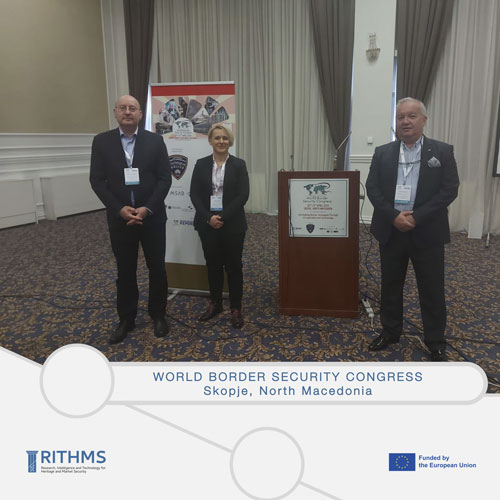
RITHMS at World Border Security Congress in Skopje
| Fabio Beltotto | News
RITHMS is featuring at the World Border Security Congress in Skopje.
Jelena Levak, Senior Project Manager at RiniGARD and RITHMS SAB Member, is presenting key elements of RITHMS digital platform highlighting how it can support border authorities activities in tackling international illicit trafficking in cultural goods.
Through Social Network Analysis (SNA), RITHMS Platform will improve the overall understanding of this transnational criminal phenomenon and speed up border checks for individuals involved in criminal networks potentially overlapping with illicit trade of cultural property.
Furthermore, capitalizing on the efforts of border police and customs authorities, RITHMS project intends to promote a more active and efficient international cooperation in combating the phenomenon.
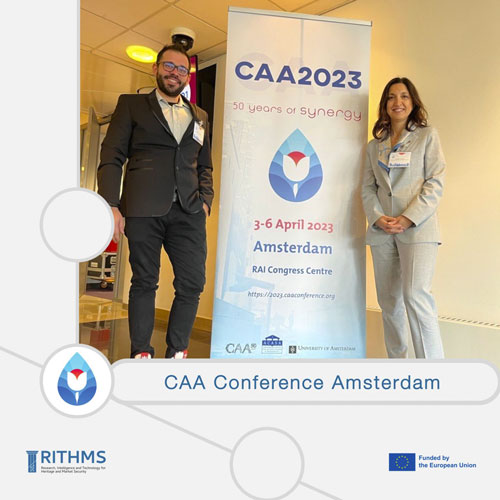
RITHMS at CAA Conference 2023
| Fabio Beltotto | News
In Amsterdam, the Centre for Cultural Heritage Technology, Coordinator of RITHMS project, chaired the CAA 2023 Session: “Hey Google, stop that looter”. Digital technologies against cultural heritage crimes.
Dr Luigi Magnini opened the session by introducing the problematic use of metal detectors, which has been spreading and affecting both archaeological and historical sites. His talk illustrated how this issue is growing due in part to weaknesses in the regulatory system, especially in Italy, where also World War I sites are targeted by amateurs and hobbyist detectorists, socially accepted despite the illegality of such activities.
Following up, Dr Arianna Traviglia highlighted the potential of Earth Observation and satellite image analysis as an effective solution for monitoring looting activities and the illegal use of metal detectors. With this regard, she discussed the ESA-funded ALCEO project, implemented by CCHT, which aims to develop Artificial Intelligence methods for automatically detecting and classifying looted cultural heritage sites by exploiting multi-temporal satellite data.
Talking about new methods for detecting looting, Dr Michelle Fabiani presented a novel approach to creating robust and reliable spatiotemporal data on cultural heritage destruction using open-source data. Her talk delved into two projects - one using satellite data in Egypt and the other using open-source intelligence reports in Syria - and focused on the methods of data collection and validation. She then concluded with a demonstration of the utility of these methods in a case study in Egypt.
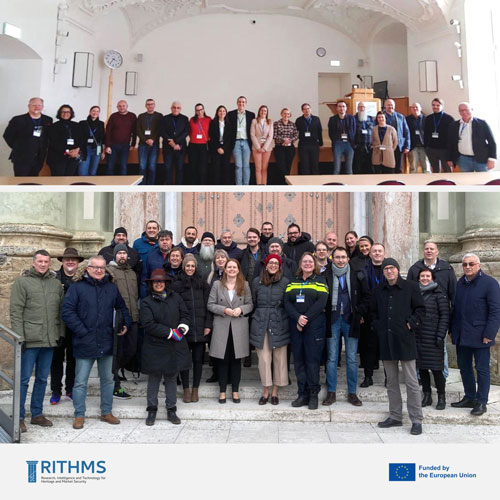
RITHMS First Workshop
RITHMS Consortium met in Fürstenfeldbruck, Munich, for the First Workshop, to get started with the deliverables dedicated to the legal, security, and technical requirements.
The Bayern School of Police hosted this three-day operational meeting where the first bricks for the SNA Platform's development were laid down.
RITHMS partners are already actively engaged in the implementation steps.
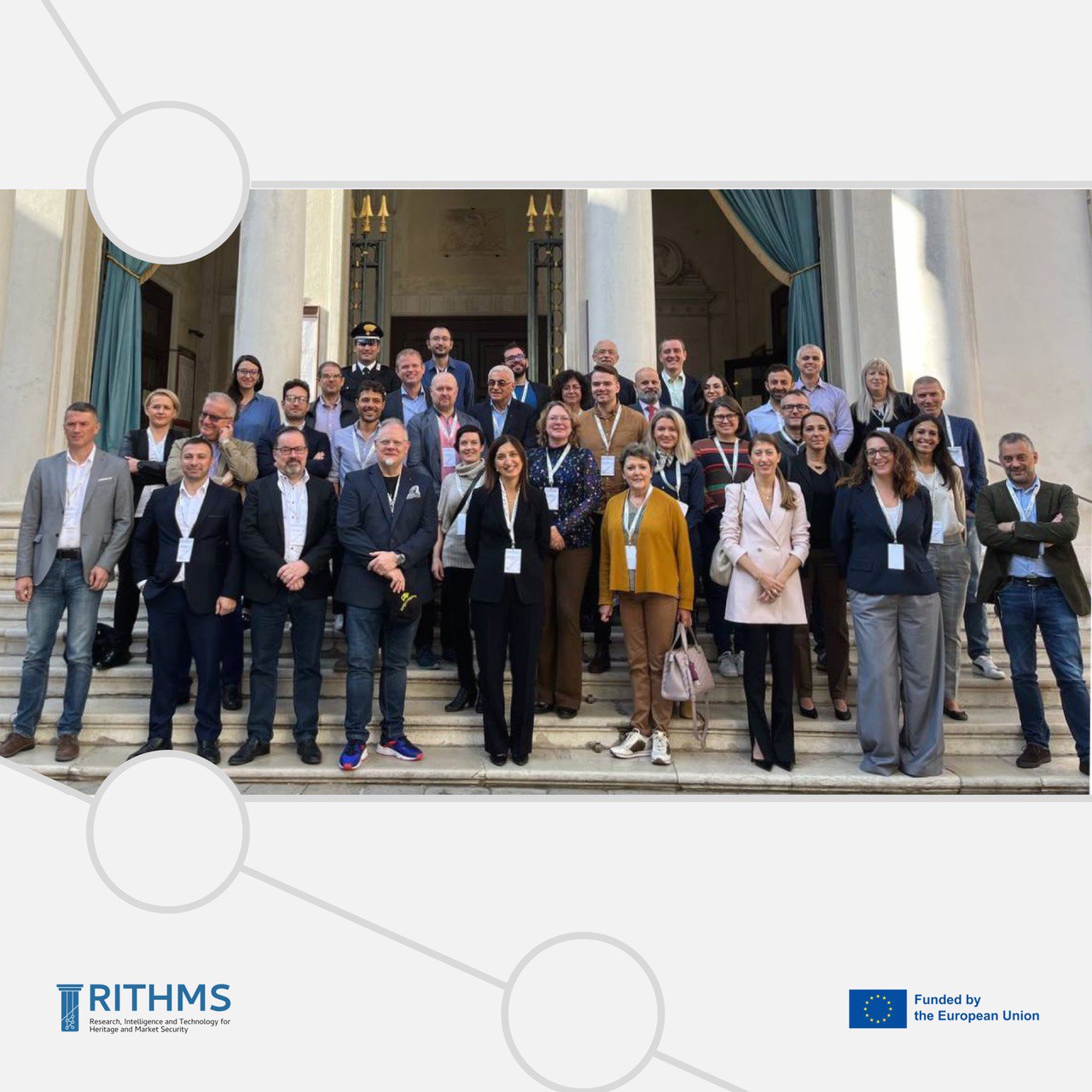
RITHMS Kick-Off Meeting & First Public Conference
| Super User | Meetings
RITHMS Kick-Off Meeting and RITHMS First Public Conference took place in Venice, in the wonderful halls of the Ateneo Veneto on October 12-14, 2022.
Numerous representatives of the Consortium gathered in person for the first time for a two-day discussion outlining the actions and next steps of the Project.
Cultural heritage, illicit trade, provenance research, security and IT innovations will be our main topics for the next years: don't miss RITHMS updates and follow us!
